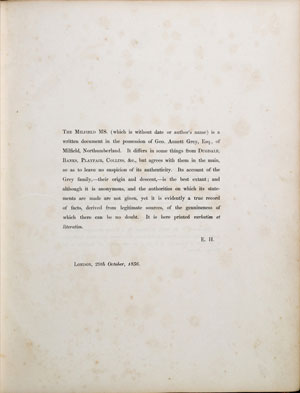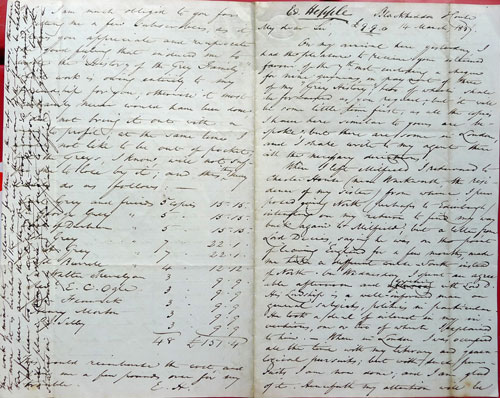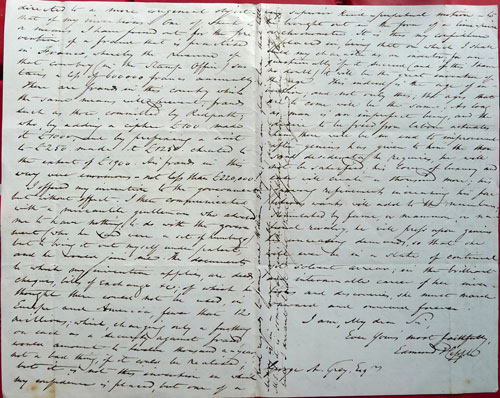1. CHARLES EARL GREY.
"On stone by C. J. Culliford, 22 Southhampton St, Strand, London. Printed by Metchim and Burt, 20 & 55 Parliament Street West.tr, London. Designed by Edmund Hepple."
Earl Grey is shown surrounded by his achievements. Top left: "Queen Caroline Not Guilty", Top right: 1st August 1834, (Brittania is shown freeing a slave) Bottom left: The Reform Bill, Bottom right: " Free Trade " Bottom centre: His coat of arms of a lion rampant, the crest of a scaling ladder and the motto "De Bon Vouloir Servir le Roi", Norman French for "To serve the King with right good will."
Geo Annett Grey. The original "Milfield M.S." has not been found.
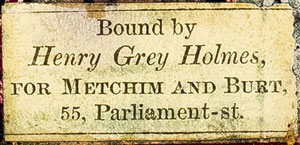

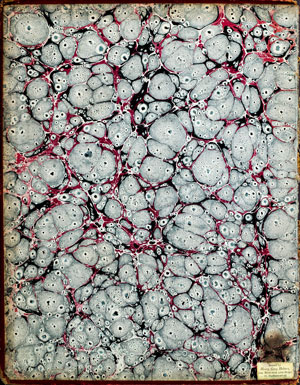
Genealogy of the Grey Family of Northumberland by Edmund Hepple. 1856. On page 3, Edmund Hepple writes: "THE MILFIELD MS. (which is without date or author's name) is a written document in the possession of Geo. Annett Grey, Esq., of Milfield, Northumberland. It differs in some things from DUGDALE, BANKS, PLAYFAIR, COLLINS, &c, but agrees with them in the main, so as to leave no suspicion of its authenticity. Its account of the Grey family,—their origin and descent,—is the best extant; and although it is anonymous, and the authorities on which its statements are made are not given, yet it is evidently a true record of facts, derived from legitimate sources, of the genuineness of which there can be no doubt. It is here printed verbatim et literatim. E. H. LONDON, 29th October, 1856."
The book reproduces the M.S. from pages 5-26. There are "Notes" from pages 2-48, which include 3 family trees on pages 44-46. Hepple has added a copy of the Magna Charta on pages 51-77 which have not been included here. At least 48 copies of the book were printed. See note at end of page.

2. THE MILFIELD MS. :
OR,
A GENEALOGICAL AND HISTORICAL ACCOUNT OF THE
Grey Family, of Northumberland.
WITH
NOTES, CORRECTIONS, AND ADDITIONS.
BY EDMUND HEPPLE.
LONDON:
PRINTED BY METCHIM AND BURT,
20 AND 55, PARLIAMENT STREET.
1856.
3. THE MILFIELD MS. (which is without date or author's name) is a written document in the possession of Geo. Annett Grey, Esq., of Milfield, Northumberland. It differs in some things from DUGDALE, BANKS, PLAYFAIR, COLLINS, &c., but agrees with them in the main, so as to leave no suspicion of its authenticity. Its account of the Grey family,—their origin and descent,—is the best extant; and although it is anonymous, and the authorities on which its statements are made are not given, yet it is evidently a true record of facts, derived from legitimate sources, of the genuineness of which there can be no doubt. It is here printed verbatim et literatim.
E. H.
LONDON, 29th October, 1856.

4. The family of Grey hath been antient in Northumberland, and famous for military exploits.—DUGDALE. Although Dugdale makes no mention of the Grey family before the time of Richard I., yet, it appears from good authority, they were of ancient descent and great eminency long prior to that aera.—BANKS. This family rose to the highest eminence in England, where they were ennobled by the titles of Duke of Suffolk and Kent, Earl of Stamford, Baron Grey, of Codnor, Ruthyn, Wilton, Rolleston, Wark, Chillingham, Howick, and had the honour of producing that truly estimable character—Lady Jane Grey, who fell an innocent victim to the ambition of her father, the Duke of Suffolk.—DOUGLAS. The descent of this family is deduced, by a French genealogist and antiquary of great repute (Francis de Belleforest, of Cominges), from Rollo, chamberlain to the Duke of Normandy. It is one of the most ancient and illustrious in Peerage.—BURKE.
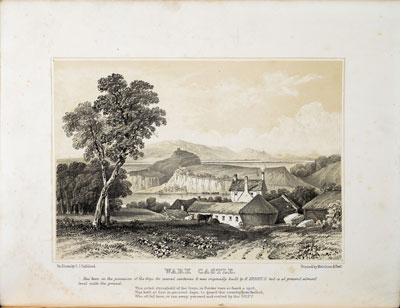
WARK CASTLE has been in the possession of the Greys for several centuries. It was originally built by K. HENRY II but is at present almost level with the ground.
This noted stronghold of the Greys, in Border wars so fam'd a spot,
Was built at first in ancient days; to guard the country from the Scot,
Who oft fell here, or ran away, pursued and routed by the GREY.
On Stone C. J. Gulliford
Printed by Metchim & Burt.
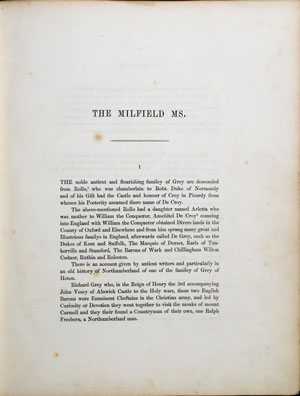
5. THE MILFIELD MS. 1 THE noble antient and flourishing familey of Grey are descended from Rollo,1 who was chamberlain to Robt. Duke of Normandy and of his Gift had the Castle and honour of Croy in Picardy from whence his Posterity assumed there name of De Croy. The above-mentioned Rollo had a daughter named Arietta who was mother to William the Conqueror, Anschitel De Croy2 comeing into England with William the Conqueror obtained Divers lands in the County of Oxford and Elsewhere and from him sprang many great and Illustrious familys in England, afterwards called De Grey, such as the Dukes of Kent and Suffolk, The Marquis of Dorset, Earls of Tankervills and Stamford, The Barons of Wark and Chillingham Wilton Codnor, Ruthin and Roleston. There is an account given by antient writers and particularly in an old history of Northumberland of one of the familey of Grey of Heton. Richard Grey who, in the Reign of Henry the 3rd accompanying John Vescy of Alnwick Castle to the Holy wars, these two English Barons were Emminent Cheftains in the Christian army, and led by Curiosity or Devotion they went together to visit the monks of mount Carmell and they their found a Countryman of their own, one Ralph Fresborn, a Northumberland man.

6. 2 When Vesey and Grey Returned to England they prevailed upon the superior of the Carmelites to let Fresborn go with them to England upon Condition they should found a monastry of Carmelites in their own Country, which they accordingly did; the Place they fixed upon was Hulne Induced as supposed from the Resemblance the adjoining hill Bore to mount Carmel this was the first monastry of Carmelite Friars in these Kingdoms. (Founded in 1240)
3 Heton Castle was then the chief seat of the Grey family which hath been very antient in Northumberland and Famous for Divers military Exploits The Castle was a staitly noble Building, and nearly Square, a Court on the West side called the Lyon's Court, and on the North side an extraordinary spacious Vault that 100 horses might stand in, was in the year 1270 (3) the estate of Sir John Grey who in that year founded a monastry at Berwick for the Order of White Friars. (Henry 3rd. Wallis History of North. Page 1.)
Succeeded by Sir Ralph Grey An Inquisition Post mortum taken after the Death of Ralph Grey shews amongst many other estates that the manor of Howick was then in the Possession of the Grey Family. Heton Castle then the seat of Sir Thomas Grey Capt- of Norham Castle who Defended it against the Scotch (who then Besieged it) with Great Bravery and obliged them to Desist from there Ienterprise and Retire. (This inqision was produced at a trial of Law at the Assizes at Newcastle, 23 Agt, 1770, between the Duke of Northumberld. and Sir H. Grey Bat.)
4 In Edward the second's time Thos- De Grey being Governour of the Castles of Couper and Fife in Scotland came into that Realm shortley after his Coronation and with twenty-six men Broke through those forces which Gualter De Bickerton had laid to Intrap him Other Particulars no less memorable (to witt) at the siege of Strayhelin
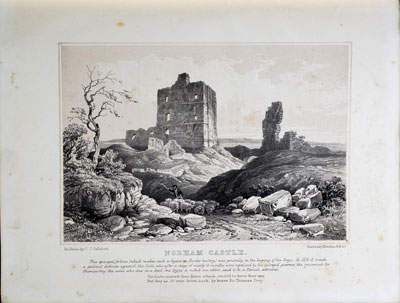
NORHAM CASTLE. This episcopal fortress (which makes such a figure in border history) was generally in the keeping of the Greys. In 1318 it made a gallant defence against the Scots, who after a seige of nearly 12 months, were repulsed by the intripid governor, the renowned Sir Thomas Grey, who slew in a duel one Cryne a noted sea-robber said to be a Flemish admiral.
The Scots renewed their fierce attack resolved to force their way
But they as oft were driven back by brave Sir Thomas Grey.
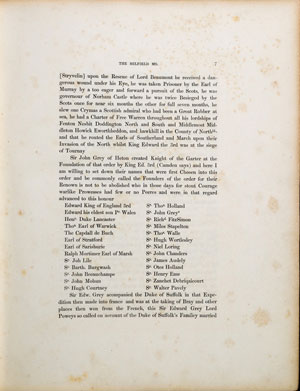
7. [Stryvelin] upon the Rescue of Lord Beaumont he received a dangerous wound under his Eye, he was taken Prisoner by the Earl of Murray by a too eager and forward a pursuit of the Scots, he was governour of Norham Castle where he was twice Besieged by the Scots once for near six months the other for full seven months, he slew one Crymas a Scottish admiral who had been a Great Robber at sea, he had a Charter of Free Warren throughout all his lordships of Fenton Nesbit Doddington North and South and Middlemost Mid-dleton Howick Eworthheddon, and hawkhill in the County of Northld and that he routed the Earls of Southerland and March upon their Invasion of the North whilst King Edward the 3rd was at the siege of Tournay Sir John Grey of Heton created Knight of the Garter at the Foundation of that order by King Ed. 3rd (Camden says) and here I am willing to set down their names that were first Chosen into this order and be commonly called the Founders of the order for their Renown is not to be abolished who in those days for stout Courage warlike Prowesses had few or no Peeres and were in that regard advanced to this honour Edward King of England 3rd Sr- Thos- Holland Edward his eldest son Pr- Wales Sr- John Grey4 Heny- Duke Lancaster Sr- Richd- Fitz Simon Thos- Earl of Warwick Sr- Miles Stapelton The Capdall de Buch Sr- Tho«- Walle Earl of Stratford Sr-Hugh Wortlesley Earl of Sarisburie Sr- Niel Loring Ralph Mortimer Earl of Marsh Sr- John Chanders Sr- Joh Lile Sr- James Audely Sr- Barth. Burgwash Sr- Otes Holland Sr- John Beeauchampe Sr- Henry Erne Sr- John Mohun Sr- Zanchet Debriqaicourt Sr- Hugh Courtney Sr- Walter Pavely Sir Edw. Grey acompanied the Duke of Suffolk in that Expedition then made into france and was at the taking of Bray and other places then won from the French, this Sir Edward Grey Lord Poweys so called on account of the Duke of Suffolk's Familey married

8. Ann one of the Deaughters and coheirs of Charles Brandon Duke of Suffolk but By her had no Issue 6 It appears by an" Inquisition taken in that Reign that the Castle manor and villa of Wark then belonging to Sir Thomas Grey of Heton who was summoned to Parlement at Westminster 6 Octr-1399 and was one of the Committe to Receive the renunciation of Kins: Richd- 2nd at the Tower Being then Procurator General or Proxy for the Northern members, he was Captain of Wark Castle, but in his absence attending Parliment it was taken by the Scots who after Plundering it Pulled it down to the ground Sir Thos- Grey was in great Favour with Henry 5th and was one of the Privy Council, but joining in the conspiracy with Edward Duke of York Richd- Earl of Cambridge and Henry Lord Scrope against the King on behalf of the French he with suffered Death for the same the second year of Henry 5th5 Sir John Grey of Heton succeeded his Father Sir Thos- Grey afterwards Lord Poweys and Earl of Tankerville.6 7 The occasion whereby this Honour of Poweys came to ye Grey / Family was by the marriage of Sir John Grey Knight son of Sir Thos- Grey Knight by Jane his wife who was Deaughter of John Lord Mobray with Joan one of the Deaughters and Coheirs of Sir Edward Charlton Knight Lord Poweys. This Sir John Grey Being a man of great action in his time was in the 2nd Henry 5th with that King at the siege of Caen in Normandy, and in the 4th Henry 5th Retained by Indenture to serve him in his wars of France with 40 men at arms whereof himself and one other Knight to be part of the number the rest Esquires, and one hundred and twenty archers having for himself and the other Knigh 4sh- per day and for the esqrs- 1s. per day being then stiled Sir John Grey of heton Knight, he behaved himself so valienly in that service that as a reward for the same he had the next Ensuing Year a grant from
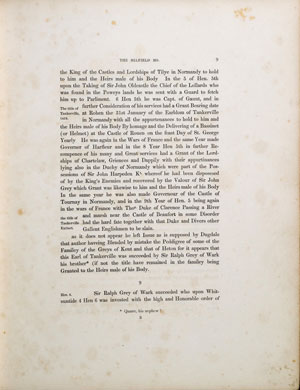
9. the King of the Castles and Lordships of Tilye in Normandy to hold to him and the Heirs" male of his Body In the 5 of Hen. 5th upon the Taking of Sir John Oldcastle the Chief of the Lollards who was found in the Poweys lands he was sent with a Guard to fetch him up to Parliment. 6 Hen 5th he was Capt. of Gaunt, and in Consideration of his services had a Grant Bearing date at Rohen the 31st January of the Earldom of Tankerville Normandy with all the appurtenances to hold to him and the Heirs male of his Body By homage and the Delivering of a Bassinet (or Helmet) at the Castle of Bouen on the feast Day of St. George Yearly (The Title of Tankerville 1419) He was again in the Wars of France and the same Year made Governer of Harfleur and in the 8 Year Hen 5th in farther Recompence of his many and Great services had a Grant of the Lordships of Chartelaw, Griences and Dappily with their appurtinances lying also in the Duchy of Normandy which were part of the Possessions of Sir John Harpeden Kt. whereof he had been disposesed of by the King's Enemies and recovered by the Valour of Sir John Grey which Grant was likewise to him and the Heirs male of his Body In the same year he was also made Governour of the Castle of Tournay in Normandy, and in the 9th Year of Hen. 5 being again in the wars of France with Thos- Duke of Clarence Passing a River and marsh near the Castle of Beaufort in some Disorder had the hard fate together with that Duke and Divers other Gallent Englishmen to be slain. (the title of Tankerville Extinct) as it does not appear he left Issue as is supposed by Dugdale that author haveing Blended by mistake the Peddigree of some of the Familey of the Greys of Kent and that of Heton for it appears that this Earl of Tankerville was succeeded by Sir Ralph Grey of Wark his brother* (if not the title have remained in the familey being Granted to the Heirs male of his Body. 9 . Sir Ralph Grey of Wark succeeded who upon Whitsuntide 4 Hen 6 was invested with the high and Honorable order of (Hen. 6) * Quaere, his nephew ? B

10. the Garter, by John Duke of Bedford Regent of England at Leicester the King himself at the same time Receiveing that Hon. from the same hand This Sir Ralph Grey was Captaian of Wark and Roxbrough Castles the last of which he Defended with Emminent Courage for 20 days angst. an army of 30000 Resolute Scotchmen headed by their Sovereign James 1st and Constrained them to raise the seige he was appointed Capt. of Balmbrough Castle By the house of Lancaster in which he was taken Prisoner after his Retreat from the Battle in Hexhamshire This fatal and Bloody Battle was fought on the Plains Called the levels by the Riverlet of Divil between the Houses of Lancaster and York about the Year 1463 in which the house of York gain'd the Victory of the York Party were the names of the Ogles of of this County of the vanquished Party were the Rooses the Percys the Greys the Nevills and the Tailloys. The Duke of Somerset was Instantaneously executed at Hexham after the Battle being a Changling and Deserter from King Edwds. Party Sir Ralph Grey Knt. of the most noble order of the Garter and Captain of Wark Roxbrough and Balmbrough Castles, with Sir Wm. Tailboy and Sir Humy. Nevill were all three Beheaded at Doncaster.7 In this same Reign their was one of this Familey of Grey a man of Great note who being Charged by a Gentleman of Scotland of Adultery with the Queen of Scotts came with a Band of a Thousand men to Edinbrough and there cast down his Glove to encounter in the lists with his accuser but Departed without Fighting. Sir Ralph Grey of Chillingham on Inquision Post Mortum taken after his Death in 10 Heny. 8 Produced at Newcastle by Sir Heny. Grey upon the trial Before mentioned with the Duke of Northumberland in which Sir Henry Grey had a Verdict in his Favour angst. the said Duke who claimed the sea wrecks on the coast of Howick and which appeared upon the Tryal to have allways belonged to the Grey Familey as Lords of the Manor of Howick. 11 Edward Grey of Chillingham Esqr. settles all his Castles Honours and Estates upon his son Ralph Grey (1523, Hen. 8.)
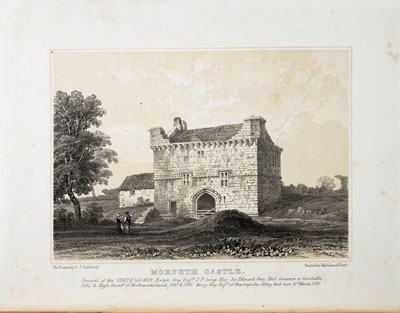
MORPETH CASTLE Domicil of the Greys till 1629. Ralph Grey Esq.re. J.P. temp: Eliz:Sir Edward Grey Knight: Governor or Constable, 1584-9: High Sheriff of Northumberland 1597 & 1598. Henry Grey Esq.re. of Newminster Abbey, died here 31st March, 1597.

11.Edward Grey Died and left his said son Ralph an Infant at the age of 2 Years and 8 months old to the wardship of Sir Thos- Clifford Knt. This Ralph Grey was in the 6th King Ed. 6 appointed Lord warden of the West marishes and in the 1st of May the 1st on 21 June her Majesty by Letters Patent and under the Great seal of England Grants to the said Ralph Possesion of his Father's lands titles and Honours he was high sheriff of N.thumb. 5 Queen Elizh. Sir. Thos- Grey of Wark his son and Heir who was high Sheriff of Northd. 16th of Eliz. This Sir Thos. Grey married Mary 2nd Daughter of Thos- Percy the 7 Earl of Northd.,* by ann his wife who was Daughter of Hen. Somerset Earl of Worcester (note this Thos. Earl of Northd. was Beheaded at York the 14th of Queen Eliz. the 22nd of Augt.) This Sir Thos. Grey left five sons Ralph Edward Henry Roger and Arthur. (Se an inquist. taken after his death 7 Eliz.) t 12 (Queen Elizbth) Ralph Grey of Chillingham Esqr. Eldest son of the aforesaid Sir Thos- Grey which Ralph Grey succeeded by his deed of Settlement dated 1st September 1592 settles all his Estates in Northd. and Durham and (in Trustees) for the use of him and his Heirs male and for Default then to his brother Edward Grey of Morpeth Castle Esqr. and his Heirs Male and for Default to his Bror. Henry of the Abbey of Newminster near Morpeth and his heirs male and for Default to his Brors. Roger and Aurther and for Default he Intails upon Divers other Branches of the Grey Familey From this Ralph Grey of C hillingham Continued the Family of Greys of Chillingham afterwards Sir Ralph Grey Knt. , From his Brother Edward Grey of Morpeth Castle Esqr- Descended the Greys of Howick. Henry Grey of Newminster abbey Esqr- the third Brother is supposed to have died there and to have been Interred in the Chancel of Morpeth Church where is now to be seen the following Inscription In the Chancel of Morpeth Church is a flatt sepulcharall stone with this Inscription. * Playfair says the same; but this lady was prioress of the English nunnery at Brussels.

12. In Obitum Henrici Graii Keeper De Novo monasteria armig. Qui obit ultimo Die Martii anno domini 1597. Posnit Thomas Grey Alius primogenitus Pictatus Ergo. Underneath is the Coat armorial of the Greys of Chillingham and on the one side is the motto De bon Valoir Below are some verses in lattin of the two Brors- Roger and Arthur Grey. I find little or no mention made save the above Rog. and Arthur sell by Deed their part of the Estate of Howick to their Brother Edward Grey of Morpeth Castle afterwards stiled Sir Edwd. Grey. Note I proceed with an account of the family of the Greys of Chillingham to the Death of Ralph Lord Grey the last of that name and family of that house of Chillingham continued from Ralph Grey Esqr. son of Sir Thos- Grey of Wark now Sir Ralph Grey Sir Ralph Grey twice married First to Isabella Deaughter and Heir of Sir Thos- Grey of Horton Castle a younger Branch of the Greys of Heton* and Issue one son William Grey Esqr. Second venture had Issue Robt. Grey a Doctr- in Divinity and a prebendary of Durham Died un- married Edward a Colonel in the service of Parliment in Char8- 1st was Killed at Munster in Ireland unmarried one Daughter married to Sir William Cony no Issue. (James 1st) William Grey Esqr- Created a Bart.- 15 June 17 James 1st 1619 in the year following he was Representative in Parliament for the County of Northd. he was raised to the Peerage by the stile and title of Lord Grey of Wark 21 James 1st he was very active in the late Great Rebellion on the Parliment side the Countys of Norfolk Suffolk Essex Hartford and Cambridge associated under his command- to support their designs he also with Coln. Harvey Joined with Gen1- Essex to Relieve Gloucester when it was Besieged by the King he was speaker of the House of Lords when they acted without the King, the Court of the Duchy of Lancaster when it was taken * This is incorrect; she was the wife of his father. Burke, in his “Extinct Peerage,” has fallen into the same mistake.
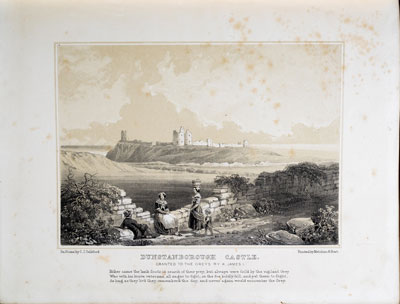
DUNSTANBOROUGH CASTLE. GRANTED TO THE GREYS BY K. JAMES 1.
Hither came the lank Scots in search of their prey, but always were foil'd by the vigilent Grey,
Who with his brave veterans, all eager to fight; on the foe boldly fell, and put them to flight,
As long as they liv'd they remembered the day, and never again would encounter the Grey.

13.from the Crown, was Invested in him and Lenthal the Speaker of the House of Commons.8 The said Wm. Lord Grey was Jointly with Sir Thos. Widdrington made Keeper of the Great seal of England which the Parliment assumed the Disposal of it with the salary of £1000 per ann his Lordship married ann the Deaughter and Coheir of Sir John Wentwork of Gosfield in Essex Bart. he died ye 29 July and was Buried at Epping in Essex. (Dunstanburgh Castle ganted to Wm L. Grey James 1st Feby.22d year if his reign. Se Wm. Lord Grey’s will at Howick) By which Ann he left Divers sons and Deaughters But of them Ralph survived and one Daughter named Catherine (the Rest Dying young or unmarried) who first unto Sir Edward Mosely of Hough in the County of Lankester and afterwards married Charles Eldest son of Dudley Lord North since summoned to Parliment by the title of Lord Grey of Roulstone. Ralph Grey son of Wm. Lord Grey and now Ralph L. Grey married Catherine Daughter of Sir Edward Ford of harting in Sussex widow of Elexd. Colepepper Eldest son of John Lord Colepepper Lord Ralph Grey Died 15 June 1675 and was Buried at Harting in Sussex, left Issue three sons Ford Ralph and Charles and one Deaughter Catherine Se Ralph Ld- Grey's will and Lady Catherine will at Howick 16 - Ford Lord Grey married Mary Daughter of Geo. Lord Berkley in the Reign of Wm. 3 1692 Created Viscount Glendale and Earl of Tankerville and the Day following 9th May was sworn and admitted one of the Privy Councill and also one of the Commissioners of Trade and Plantations and in the year 1700 was Created Lord privy seal he was first Commissioner of the Treasury and one of the Lords Justices During his Majesty's absence His Lordship departed this life in the 25 June 1701 9 The Earl of Tankerville left Issue one Daughter only the Lady Mary Grey — with him died the title of Viscount Glendale and Earl of Tankerville and was succeeded by his Brother Ralph Grey Governour of Barbadoes now Lord Grey of Wark Ralph

14. Lord Grey of Wark died 20 June 1706 unmarried Catherine their sister married to Richard Nevill of Billingbran Esqr. 17 Lady Mary Grey Daughter and heir of Ford Grey Earl of Tankervffle Deceased married Charles Bennet Lord Ossulstone in the year 1695 he in regard of his Lady was in Geo. 1st Created Earl of Tankerville he was made Chief Justice in Eyre of all his Majestys Forests Chaces Parks and Warrens South of the Trent and Kt. of the most Noble Order of the Garter10 ( title of Tankervils came to Bennet Family) Ralph Lord Grey Governour of Barbadoes before mentioned was the last of Familey of Greys of Chillingham, he by his last Will left one half of the Familey Estates (to witt) Chillingham heton Wark &c &c to his Niece Lady Mary Grey then Lady Ossulstone afterwards Countess of Tankerville Which Family the Estates and Titles is now in. The other half of the Estates of the afsd. Ralph Lord Grey he left to his Cousin John Grey of Howick Esqr. the next male heir of the Familey which is now in the possession of Sir Henry Grey Bart. of Howick. Note, here proceed with an account of the Familey of Greys of Howick
18 Edward Grey of Morpeth Castle Esqr. 2nd son of Sir Thos. Grey and next Brother of Ralph Grey Esqr. of Chillingham came in pos session of Howick There is an old Deed of Division of Lands between the said Edwd Grey and John Craster of Craster which shews them in Possession of Howick ( 1607 1st July 4 James 1st Se deed at Howick) William Lord Grey of Wark by Deed Grants Leirmouth mill with the Land Belonging to Ed. Grey son of Sir Edwd. Grey of Morpeth Castle (uncle to the sd. Wm. Lord) for the life time of the said Ed. Grey the Younger paying Yearly one peper corn if Demanded. ( Chas.1st) 9 Edwd. Grey Grandson of Sr. Edwd. Grey was in posses- sion of Howick he married Fenwick Daughter of Martin
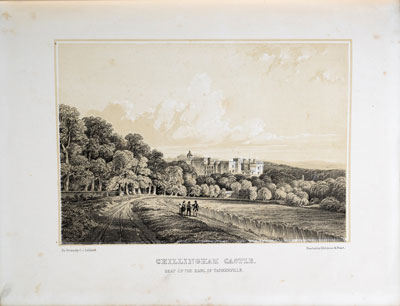
CHILLINGHAM CASTLE
SEAT OF THE EARL OF TANKERVILLE

15. Fenwick of Kenton Esqr. left Issue 4 Sons Phillip Edward John and Martin. Phillip 1st Son married Magdalen The Daughter of Foster of Adderstone Esqr. left Issue one son Phillip who died very young and two Daughters Magdalen and Elizth. who Both Died at Durham unmarried • Edward 2nd son Died at Howick unmarried and by his last will dated the 22nd March 1666 he Devised his Estate of Howick to his Brother John Grey of Acton and his Estate of Overgrass to his youngest Brother Martin Grey who he appointed his sole Executr. John 3rd son Married to Dorothy the Daughter and coheir of Lisle of Acton Esqr. left Issue 4 Daughters Susanna married to Mr. Bell Dorothy married to Bobt. Ogle of Edlingham Esqr. Mary married to George Towry Esqr. Margaret married to Charles Brandling Esqr.and one son John Grey which John Grey Esqr. left Issue 3 sons Henry Esqr. afterwards Sir Henry Grey Bart. Thos. Grey who died at Howick unmarried John Grey now of Morrick Esqr. Martin the 4th son married Elizth. Daughter of Matthew Foster of Balmbrough Esqr. left Issue 6 sons 1st Phillip no issue male 2nd Edward two Daughters, Mary married to Wm. Cooper Esqr. Docter of Physic Newcastle ann married to John Grey of Morrick Esqr. 3rd John whose son left one son John married to Ann the Daughter of John Grey of Morrick Esqr- 3rd John whose son John left one son Tohn married to Ann the daughter of John Grey of Morrick Esqr- 4th son Martin married to Mary the Daughter of Thos. Davison Esqr. left Issue one son Edward Grey now of Overgrass 5th son Ralph no Issue male 6th son Matthew Died unmarried [The MS. ends here; the continuation of the pedigree, as follows, is by E. H.] :— The aforesaid Edward Grey died in 1653, and was succeeded by his eldest son Philip, whose son and daughters dying without issue, his nephew, John Grey of Howick (only son of John Grey of Acton, who married Dorothy Lisle) became his heir. This gentleman married the daughter of Pearson, by whom he had three sons, viz. :—1. Sir Henry. 2. Thomas, who died unmarried at Howick. 3. John Grey of Morwick, who married Ann daughter of Edward Grey of Alnwick, by whom he had three daugh-

16. ters and three sons, viz.—Margaret-Anne, who married John Grey, already mentioned; and Mary, who married William Hay; John, a Captain in the army, killed in Germany; Henry, a Lieutenant in the royal navy; and Charles of Morwick, who married Catherine, daughter of the Eev. John Skelly, by Lady Betty Gordon, his wife, and died in 1814, leaving a son, Sir John Grey, Lieutenant-general in the army, K.C.B., who at his decease, in 1856, bequeathed his estate of Morwick to his relative, the Right Hon. Sir Geo. Grey, Bart., Secretary of State for the Home Department. The sisters of General Grey were Ann, married to the Rev. John Hunter, and Catherine the wife of John Burrell, Esq., father of Capt. George Burrell. The said John Grey, was succeeded by his eldest son, Henry Grey, Esq., who was created a Baronet, 11th January, 1746. Sir Henry served the office of Sheriff for the County Northumberland, 1736. He married Hannah, daughter of Thomas Wood, Esq., of Falloden, by whom he had five sons and four daughters, of whom were—Henry, his successor, as second Baronet, who died unmarried in 1808, when the Baronetcy devolved upon the late Earl; Thomas, who fell in a duel with Lord Pomfret, and buried in South Audley chapel; Margaret, married to Sir Grey Cooper; Elizabeth, married to Sir James Pennyman, Bart. Sir Henry died in 1749; his fourth son, Sir Charles Grey, K.B., having adopted the military profession, was advanced to the rank of Major-general in 1777, Lieutenant-general in 1782, and General in 1796. Sir Charles acquired distinction in the first American war, in which he had an important command; in 1794 on the breaking out of hostilities with the Republic of France he was appointed Commander-in-chief of the land forces, sent to reduce the West India Islands, in conjunction with Lord St. Vincent who had charge of the naval operations; on January 8th, 1783, he was invested with the ensigns of the order of the Bath ; into which however he was not installed till the 19th May, 1788. He earned this distinction by his long military services in the preceding contest with America; and by a regular gradation of active employment from the time of his first entry into the army. He was Aid-de-camp to Prince Ferdinand at the battle of Minden, at which he was wounded in the foot; he was also with General Wolfe at
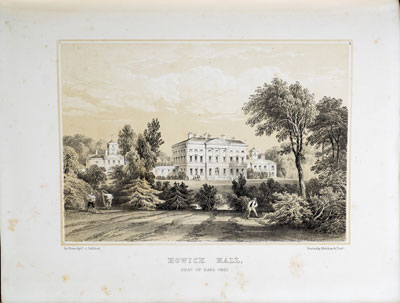
HOWICK HALL
SEAT OF EARL GREY

17. the taking of Quebec. In 1797 he was sworn one of his Majesty's Privy-council. At length worn out with age, and active services, he retired to his seat in his native county, to pass the remainder of his days in the bosom of his family. His Majesty, however, was not forgetful of his merits, even in retirement, for, during the Addington administration, he was elevated to the peerage by the title of Baron Grey de Howick, in the county of Northumberland, by patent, dated 23rd May, 1801; and was further advanced to be Viscount Howick, and Earl Grey, 11th April, 1806. He died 14th November, 1807, aged 78, being then governor of Guernsey. His remains were conveyed, on Thursday, the 26th of the same month, from Falloden House, for interment at Howick, where they were deposited in the family vault. The funeral was attended by the Earl, his son (and Countess), Mr. and Lady Elizabeth Whitbread, the Hon. and Kev. Mr. Grey (afterwards bishop of Hereford), and the Hon. Commissioner Grey. His Lordship's charities were only limited by his means, his heart was unbounded, and no deserving object ever sought relief at Falloden House in vain. The same benevolent spirit which he carried with him into retirement was uniformly displayed in his military career, through the whole of which the comfort of the private soldier was a peculiar object of his care. His Lordship married, in 1762, Elizabeth daughter of George Grey Esq., of Southwick, by whom (who died 26th May, 1822) he had issue:—1. Charles, Viscount Howick. 2. Sir Henry-George, G.C.B., G.C.H., a General in the army, and Colonel 13th light dragoons, born 25th October, 1766; married 20th August, 1812, Charlotte, only daughter of the late Sir Charles Des Voeux, Bart.; and died 11th January, 1845. 3. Sir George, K.C.B., Captain, R.N., created a Baronet 2nd July, 1814, died 3rd October, 1828. 4. William, Lieut.-colonel in the army, who was born 20th October, 1777, and dying 10th August, 1817, left issue by his wife, Maria, daughter of General William Shirreff:—William-Thomas, born 22nd April, 1807; married 7th January, 1841, Maria-Georgiana, second daughter of Captain William-Henry Shirreff, R.N., Superintendent of the Dockyard at Chatham; Charles-Conrad, Captain, R.N., born 2nd January 1817; married, 23rd April, 1844, Caroline Nesbit, eldest

18. daughter of the late Major Turner Macan, of Carriff, co. Armagh, and died 29th May, 1848; Maria-Susanna; Emily-Hannah, married, in 1837, to James Duberley, Esq., of Gaines Hall, Huntingdonshire. 5. Edward, Bishop of Hereford, Prebendary of Westminster, born 25th March, 1782; married, first, 21st March, 1809, Charlotte-Elizabeth, daughter of James Croft, Esq., of Greenham, Berks, by whom (who died 26th May, 1821) he had issue—Edward, Lieutenant, R.N., died in 1835; Charles, married Sarah, daughter of W. Gyde, Esq., of Cheltenham, and died in 1839; Leopold-James-Henry, Bengal Civil Service, married, in 1842, Emily-Maria, daughter of Lieut.-colonel Costley, and died in 1845; William, married, 1845, Margaret Hungerford, daughter of W. Jackson, Esq., E.I.C.C.S.; Elizabeth, married, 1836, to the Rev. William-Henry Maddock, Vicar of Kingston, Hereford; Charlotte, married, 1840, to Andrew Wilson, Esq., Mary, married, 1839, to William Alexander, Esq., E.I.C.C.S.; Harriet, married, 1843, to the Rev. H. R. Lloyd, Vicar of Carew, Pembroke; Hannah-Jane. The Bishop married secondly, 1824, Elizabeth, daughter of the Right Hon. Sir Robert Adair, G.C.B., and by her (who died in 1829) had issue:—Fred. - Septimus, born 12th June, 1826; Alexander-Thomas, born 12th June, 1826, and died 29th May, 1836; Francis-Douglas, born 11th April, 1828; Arthur-John, born 10th September, 1829. The Bishop married thirdly, 1831, Eliza, daughter of John Innis, Esq.; and by her had one son and two daughters; Alfred, born 1834; Louisa and Alithea-Emma. He died 24th July, 1837. The sisters of the Bishop were—1. Lady Elizabeth, born 7th April, 1765, married January 18th, 1789, Samuel Whitbread, Esq., M.P., for Bedford, and had issue, Elizabeth born 21st December, 1791; William born 4th January, 1795; Samuel-Charles, born 16th February, 1796; and Emma-Laura, born 19th January, 1798. 2. Lady Hannah-Althea, married 24th August, 1807, Captain Bettesworth of the Tartar frigate, who was killed in action 25th May, 1808; and after his decease was the wife of the Right Hon. Edward Ellice. Charles, second Earl K.G., succeeded his father the 14th November, 1807; he succeeded also his uncle, Sir Henry Grey of Howick, at whose decease the year following he became third Baronet.
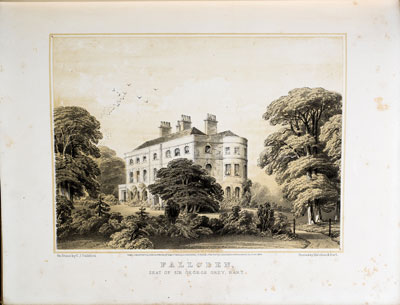
FALLODON,
SEAT OF SIR GEORGE GREY, BART.

19. Lord Grey was born at Falloden, near Alnwick, on the 15th of March, 1764, the eldest son of Sir Charles Grey, K.B., the first Earl Grey, by Elizabeth, daughter of George Grey, of Southwick, co. Durham, Esq. He received his education first at Eton, and subsequently at King's College, Cambridge. At the age of eighteen he visited the continent, and made the tour of several of the European States. Whilst in Italy he made the acquaintance of H.R.H. Henry-Frederick, Duke of Cumberland, who gave him an appointment in his household. He returned to his native country in 1786, and in the same year he was returned to parliament for the county of Northumberland, the vacancy having been occasioned by the elevation of Lord Lovaine to the Upper House. He had not, however, completed his twenty-first year until two or three days previous to that on which he took his seat. To the surprise of his connections, whose political principles were on the other side, he immediately joined the Whig party, then in opposition under Charles Fox. His first speech was delivered in the debate on Mr. Pitt's commercial treaty with France, and gave presage of the talent by which his long parliamentary career was subsequently distinguished. The oratorical ability which he displayed on this occasion secured him a foremost position in the House; and during the same session, which was his first, he was named one of the managers in the impeachment of Warren Hastings; and from that time he always took a leading part in the debates. In 1792, Mr. Grey became a member of the Whig Club, and shortly afterwards of the great political confederation known as the " Friends of the People," the avowed object of which was to obtain a reform in the system of parliamentary representation. At the head of this formidable association stood the names of the principal members of the Whig party, and it included thirty-two members of Parliament. Mr. Fox however, declined to enrol his name amongst them, ob-serving, " Though I perceive great and enormous abuses, I do not see the remedy." The society, however, continued to grow in numbers, and increase in influence. A series of resolutions, passed at their meetings, and a declaration of the principles and objects of the society were printed and extensively circulated. On the 30th of April, Mr. Grey gave notice in the House of Commons of a motion, which in

20. the course of the next session, he should submit to the consideration of the House, the object of which was a reform in the representation of the people. In 1793, he presented a petition from the Society of the Friends of the People, praying for a thorough reform in, and a shorter duration of parliament; and then moved that this petition, with others presented at the same time, should be referred to a select committee, to examine and report thereon. After two long debates, the motion was negatived by a majority of 282 to 41. War with France was now considered, even by some of the oldest Whigs, to be a necessary evil; but Mr. Grey rather increased his opposition. On the defeat of the Duke of Brunswick, he declared that " his retreat before the French armies was a triumph to every lover of liberty." The session of 1795 was marked by his opposing the grant for the liquidation of the Prince of Wales's debts, and his proposing that the addition should be reduced from £65,000 to £40,000. It was, however, negatived by a majority of 169 votes. His motion also for an impeachment of Mr. Pitt, and the whole body of ministers, for misapplying the public money, was lost by a great majority. In 1797 Mr. Grey brought forward his plan of Parliamentary Reform. He proposed to give the county of York four new members, and to divide each county into two districts, each returning a member. The right of voting was to be given to copyholders and leaseholders, as well as freeholders. In cities and boroughs, the elective franchise was to be extended to all householders paying taxes. Lastly, parliaments were to be triennial; his motion was supported by 91 votes, and negatived by a majority of 165. On this occasion Mr. Grey (only 33 years of age) made a long and eloquent speech, which concluded as follows:—" When he looked abroad, and surveyed the face of Europe, there was no object, which to him, as an Englishman, attached to the constitution of his country, was so desirable as a respectable and independent House of Commons, speaking the sentiments, and consulting for the interest of the nation at large. In France a revolution had taken place; the principles at least in which it originated, whatever others might think of them, he should always defend. Stained it certainly had been with enormities, but ministers themselves had

21. confessed that order was restored, and that they had asked pardon of God and man; for his own part he entertained a sanguine hope that, in the end, it would tend to the diffusion of liberty and rational knowledge all over the world; with this revolution, then, how ought the people of this country to be governed? The constitution ought to he restored to them; and when every abuse was reformed, the system would leave them nothing to regret. If you look to Ireland, you find the affairs in that country were every day becoming more alarming. God grant that a convulsion may not happen; but it can only be prevented by measures of reform and conciliation. If such an event should unfortunately take place in that country, would it not be wise to prevent all grounds for discontent in this, by removing in time every just cause of complaint? How was it possible that the House could possess the confidence of the people after having brought the country to suffer disgrace after disgrace; after being brought to the verge, if not into the gulf, of bankruptcy, without witnessing one effort, on the part of its representatives, to wipe off the stains it has received, or to save it from approaching ruin? Was it believed that the debates in that House were conducted with a view to the public good ? He admitted, for the sake of argument, that the side of the House with which he had the honour to act, were no more actuated than the other by motives of a pure disinterested nature; though, while he made the admission, his conscience acquitted him of the crime; was it not in every one's mouth that the object of the one party was to keep their places, and of the other to supplant them? And if such an opinion was entertained, how was it compatible with respect? " These were the motives which induced him to submit to the House the motion which he should have to propose. There was one other point, which was personal to himself, and upon which, perhaps, he ought not at all to trouble the House. As long as he held a seat in that House he should think himself bound to perform the duty he owed to his constituents; but he considered it as unnecessary any longer to expose himself to that obloquy which he had sustained in acting the part which he found himself called upon to take in the discussions of that House. Seeing calamity succeed calamity, and that every effort of his had hitherto been ineffectual in stemming the

22. tide of misfortune, he despaired of a continuance of his efforts being more successful; and therefore, though he should always in future be present, to vote for or against any measures by which the interests of his constituents might be affected, after that night he should not think proper to trouble the House with any observations." Mr. Grey concluded with moving, ' That leave be given to bring in a bill to amend and regulate the election of members to serve in the Commons House of Parliament.'" Mr. Grey, until the death of Mr. Pitt, continued one of his most strenuous opponents. One of his ablest speeches was made on the subject of the union between Ireland and England, to which measure he avowed his hostility in terms of the bitterest denunciation. In January, 1806, Mr. Pitt died, and Mr. Fox was called to the administration of public affairs. Mr. Grey who, by the elevation of his father to the peerage had become Lord Howick, was appointed First Lord of the Admiralty, with a seat in the Cabinet; in October following, the country was deprived of the services of Mr. Fox. Lord Howick then became leader of the House of Commons, and Secretary of State for Foreign Affairs. The abolition of the slave trade was proposed by this administration; the Sovereign took alarm at the attempt of ministers to relieve Roman Catholics from some of their existing disabilities, and they were dismissed; parliament was dissolved; Lord Howick, not choosing to contest the county of Northumberland, took his seat for Appleby. The death of his father, which occurred shortly after, removed him to the upper house of parliament on the 14th November, 1807. For some years after, his time was passed in the leisure and retirement of private life. Of his domestic circle Madame de Stael observes, that " into no English family did she ever enter with such high expectations, and in none had her highest idea been so completely fulfilled." When the Duke of Portland resigned in 1810, a negotiation was opened with Lords Grenville and Grey who, however, declared it to be quite inconsistent with their views to unite with the proposed ministry. Again, in February, 1812, the Regent expressed his wish to bring Earl Grey and Lord Grenville into the cabinet, deeming that a union of leading men would give confidence and satisfaction to the

23. country; but the difficulties were insuperable; the Marquis Wellesley, and afterwards Lord Moira, failed in obtaining their co-operation. The joint letter addressed to the Duke of York, in which Lords Grey and Grenville declined the offer of peace and power, is dated 15th February, 1812. Again, in May the same year, after the tragical death of Mr. Perceval, the same noblemen received another overture, but which they also declined.11 The retirement of the Earl of Liverpool, in 1827, placed Mr. Canning at the head of affairs. Lord Grey declined to support that statesman. His Lordship, after the death of Mr. Canning, in a speech on the second reading of the Roman Catholic Relief Bill in 1829, justified himself for having declined to extend to the deceased statesman's administration his active support. Lord Grey took a prominent part in the trial of Queen Caroline, on whose behalf he was induced to come forward with the utmost eloquence and fervour; and to the powerful effect of his able defence was mainly due the ultimate defeat of her accusers. After this his life was passed principally in the bosom of his family, until the sudden termination of the Wellington Administration in 1830, brought him forth from his retirement to assume the reins of Government. During; the four years he continued in office, he carried Parliamentary Reform and the Abolition of Slavery. After his retirement from office, in 1834, he took no part in politics, but resided principally at Howick with his family. The character of Earl Grey has been sketched as follows:— "Nature and fortune united to lavish their choicest gifts upon the deceased nobleman; in his lot were combined birth, wealth, talents, education, and a wide field of action; and when he made his celebrated declaration,—that he would stand or fall by his order, it is impossible not to acknowledge that it was men like himself who made that order, indeed the Corinthian one of our national architecture. The most splendid qualities, when aided by opportunities for displaying them, seldom fail to raise their possessor to personal distinction, but their good or evil influence on the welfare of society is purely accidental, unless they are accompanied by judgment to give them a proper direction. The character of the noble Earl, though he was some-

24. times, even at the commencement of his career, accused of being a party man, forbids all suspicion that he was actuated by any other principle than that of honour. His defence of the Prince of Wales's rights, when he thought they were endangered, and his opposition to an intended augmentation of that illustrious personage's revenues, when he thought it impolitic, evidence the presence of a strong sense of public duty. His stern rejection of the fascinations of power, though offered by the representative of majesty, rather than associate himself with men of whose political principles he disapproved, must be admitted by his enemies, if, indeed, such a man could have an enemy, to demonstrate his integrity." That all his public measures were designed by him for the good of his country, there can be no doubt, but it would be premature to venture an opinion on their ultimate issue; posterity is the only tribunal where the talents and efforts of this distinguished patriot can be fairly judged and duly appreciated. In person Lord Grey was tall, slender, and of a singularly dignified bearing; the expression of his face, though the features were small, was rather severe, but intellectual and commanding. His eloquence was of a fervid and masculine order, with a noble air of superiority, giving the idea of one of the ancient, classic orators, more than any modern speaker. This veteran statesman died at Howick Hall, Northumberland, on the 17th July, 1845, in his eighty-second year, being at the time of his decease, the second Earl Grey and Viscount Howick, Baron Grey of Howick, the third Baronet, K.G., a Privy Councillor, an Elder Brother of the Trinity House, and a Governor of the Charter House; a Vice-president of the Marine Society, Commissioner of the Land Tax, and a Trustee of the National Gallery, &c, &c. Lord Grey married 18th November, 1794, the Honourable Mary-Elizabeth Ponsonby, only daughter of William Brabazon, first Lord Ponsonby of Imokilly, and by that lady had issue ten sons and five daughters. Their names are as follows :—I. Henry, present Earl, born 28th December, 1802, succeeded his father at the age of 43; married 9th August, 1832, Maria, daughter of Sir Joseph Copley, Bart., of Sprotborough. Lord Grey is Lord-lieutenant and Custos Rotulorum for Northumberland, and was some time a cabinet minister.

25. II. Charles, born in 1804, Major-general in the army, Equerry to the Queen, and Private Secretary to H.R.H. Prince Albert, and formerly M.P. for Wycombe; married 26th July, 1836, Caroline-Eliza, eldest daughter of Sir Thomas-Harvie Farquhar, Bart., and has issue, 1, Charles, born 6th April, 1850, died 23rd June, 1855; 2, Albert-Henry-George, born 28th November, 1851; Sybil-Mary; and Victoria-Alexandrina-Elizabeth. III. Frederick-William, born 23rd August, 1805, a rear-admiral and C.B.; married, 20th July, 1846, Barbarina- * Charlotte, daughter of the Rev. F. Sullivan. IV. William, born 13th May, 1808, died 1815. V. George, born 16th May, 1809, Captain R,.N.; married, in 1845, Jane-Frances, daughter of the Hon. Sir Patrick Stuart, of Englescairnie, son of Lord Blantyre, a general in the army and Governor of Malta, and has issue, 1, Charles, born in 1846; 2, Harry-George, born 1st October, 1851; 3, Frederick, born 24th December, 1852; 4, Mary-Elizabeth; 5, Catherine-Louisa; 6, Jane. VI. Thomas, who died in 1826, aged 16. VII. John, A.M., born 6th March, 1812, rector of Houghton-le-Spring; married, in July, 1836, Georgiana-Elizabeth-Charlotte Hervey, second daughter of the Mar¬quis of Bristol, and has issue, 1, Charles-Frederick, born 7th April, 1842; 2, Frederick-Thomas, born 1844; 3, Mary-Catherine. VIII. Francis-Richard, rector of Morpeth, born 31st March, 1813; married, in 1840, Elizabeth-Dorothy-Anne-Georgiana, fifth daughter of George, sixth Earl of Carlisle. IX. Henry-Cavendish, born 16th October, 1814, late Captain in the army. X. William-George, born 15th February, 1819, Secretary of Legation at Stockholm. XL Louisa-Elizabeth, married, 9th December, 1816, John-George Lambton, Esq., M.P. for the County of Durham, afterwards Earl of Durham, and died in 1841. XII. Elizabeth, married 13th May, 1826, to J. C. Bulteel, Esq., of Fleet House, Devon, who died in September, 1843. XIII. Caroline, married 15th January, 1827, to the Hon. George Barrington, Captain K.N., second son of the Right Hon. George Viscount Barrington. XIV. Georgiana. XV. Mary, married, 30th July, 1829, to the Right Hon. Sir Charles Wood, Bart., Chancellor of the Exchequer, President of the Board of Control, and first Lord of the Admiralty.

26. KNIGHTS OF THE FAMILY OF GREY, CREATED BETWEEN THE REIGNS OF KING JOHN AND CHARLES I* THE most of them extracted from a MS. in the British Museum. The list, however, is incomplete, there being several knights omitted. Abbreviations:—W., Wilton; H., Heton ; C, Codnor ; T., Tankerville ; Wk., Wark; H.W.C., Heton, Wark, and Chillingham. Such as are blank are so in the MS. Sir John Grey, W., 1238. g Lord Richard Grey. Sir Thomas Grey, H, 1319. 9 Lord Edward Grey. Sir Robert Grey, H, 1328. g Sir Edward Grey. Sir Thomas Grey, H, 1346. 9 Sir Edward Grey, of Fyllyngham. Sir Henry Grey, W., 1366. 9 Lord John Grey- Sir Thomas Grey, H, 1390. g Lord Edward Grey. Sir John Grey, C, 1390. g Sir Thomas Grey, of Horton. Sir Richard Grey, C, 1400. g Sir Roger Grey. Sir John Grey, Lord Powis, 1400. k Lord Thomas Grey. Sir Thomas Grey, H, 1407. k Lord Grey of Wilton. Sir John Grey, H, 1430. Sir Thomas Grey, H.W.C., 1550. a Sir Henry Grey, T, 1432. i Sir Arthur Grey, W. a Sir Ralph Grey, Wk., 1432. Sir Thomas Grey, H.W.C., 1587. a Sir Richard Grey, 1432. Sir Roger Grey, of Ulchester, 1600. b Sir Ralph Grey, 1454. Sir Ralph Grey, Berwick, 6 April, 1603.+ c Sir Thomas Grey, 1471. Sir Henry Grey, Worksop, 21 April, 1603. c Sir Henry Grey, 1471. j Sir William Grey, Whitehall, 23 July, 1603. d George, Lord Grey, 1483. j Sir William Grey, Whitehall, 23 July, 1603. e Sir Thomas Grey, 1483. Sir Ambrose Grey, Whitehall, 16 Dec., 1605. e Sir Thomas Grey, Wk., 1485. Sir John Grey, Whitehall, 3 November, 1606. Sir John Grey, W., 1485. Sir Andrew Gray, Bysham, 30 August, 1616. f Lord Grey, de Ruthyn. Sir Arthur Grey, Auckland, 19 April, 1617. f John Grey, V. Lysle. Sir Edmund Gray, Chillingham, 9 May, 1617. Sir Ralph Grey, H.W.C., 1500. Sir Roger Gray, Edinburgh, 2 July, 1617. f
* Some of them were Knights of the Garter and the Bath. a Knighted at Leicester by the Duke of Bedford, on Whitsunday, 4 Henry VI., 1425. b Of Wark, Heton, and Chillingham. Beheaded at Doncaster, 4 Edward IV. c Created on the field of Grafton, near Tewksbury, by Edward IV., 3rd May, 1471. d Son and heir to the Earl of Kent, dubbed by Richard III., Sunday, 5th July, 1483. e Knighted by the Earl of Northumberland, 20 Edward IV.; the latter afterwards made a Banneret in Scotland by the Duke of Gloucester, anno 1485. f Knighted by Henry VII. on the creation of Prince Henry, 18th February, 1503. g Created in the reign of Henry VIII., the last-named on the field of Flodden, 6th September, 1513. h Created by Edward VI. i Knighted by Queen Elizabeth. j Between these two Sir Williams intervene the names of 121 other knights; but whether the latter Sir William is the same person as the former, put down twice by mistake, the MS. whence they are copied affords no means of ascertaining. + Sir Ralph Grey and the following knights were all created by King James, at the different places specified.
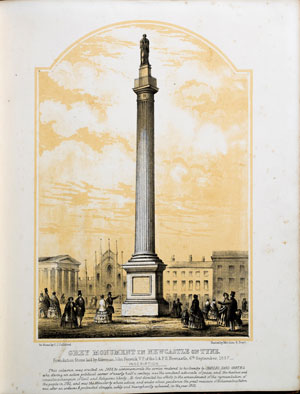
GREY MONUMENT IN NEWCASTLE ON TYNE
Foundation Stone laid by Alderman John Fenwick, V.P. of the late L. & P. S. Newcastle, 6th September, 1837.
INSCRIPTION.
This column was erected in 1838, to commemorate the service rendered to this Country by CHARLES, EARL GREY, K.G. who, during an active political career of nearly half a century, was the constant advocate of peace, and the fearless and constant companion of Civil and Religious liberty. He first directed his efforts to the amendment of representation of the people in 1792, and was the minister by whose advice, and under whose guidance the great measure of Parliamentary Reform was, after and arduous & protracted struggle, safely and triumphantly achieved, in the year 1932.

27. NOTES 1. Banks calls him Rollo or Fulbert; and Playfair says:—"This Rollo most probably was a direct descendant of Rollo, the Chief Commander, a Dane who in the ninth century invaded the Northern provinces of France, whom King Charles III., of France, afterwards converted to the Christian faith, and giving him his daughter Gisela in marriage, and with her the whole dukedom of Normandy. Rollo was succeeded by his son William, who was father of Richard, the father of the famous Robert, Duke of Normandy, whose illegitimate son, William, afterwards conquered and became King of England, It is not a little singular, that for several centuries the Danes were the only conquering nation in Europe; and at nearly the same period that Rollo invaded and conquered Normandy, they sailed up the river Seine, and burned Paris once, and a second time compelled the inhabitants to pay a large sum in money to prevent a similar catastrophe. The Seine cannot be ascended in winter without towing, on account of the rapidity of the current, and in summer is very shallow, yet the enemy arrived in boats, and burned the capital of Charlemagne, not much more than a century after his splendid conquests.” This aforesaid Rollo, the conqueror of Normandy, was a Norwegian duke, who, on account of his piracies, was banished from his country by Harold Harfager, who conquered Norway in 870. He first retired with his fleet among the islands of the Hebrides to the north-west of Scotland, whither the flower of the Norwegian nobility had fled for refuge ever since Harold had become master of the whole kingdom. He was there received with open arms by those warriors who, eager for conquest and revenge, waited only for a chief to undertake some glorious enterprise. Rollo setting himself at their head, and seeing his power formidable sailed towards England, which had been long, as it were, a field open on all sides to the violence of the northern nations. But the great Alfred had, some years before, established such order in his part of the island that Rollo, after several fruitless attempts, despaired of forming there such a settlement at should make him amends for the loss of his own country. He pretended, therefore, to have had a supernatural dream, which promised him a glorious fortune in France, and which served at least to support the ardour of his followers. The weakness of the government in that kingdom, and the confusion in which it was

28. involved, were still more persuasive reasons to insure them of success. Having, therefore, sailed up the Seine to Rouen, he immediately took that capital of the province, then called Neustria, and making it his magazine of arms, he advanced to Paris, to which he laid seige in form. This war, at length, ended in the entire cession of Neustria, which Charles the Simple was obliged to give up to Rollo and his Normans in order to purchase a peace. Rollo received it in perpetuity to himself and his posterity, as a feudal duchy dependent on the crown of France. A description of the interview between Charles and this new duke, gives us a curious picture of the manners of these Normans (as they were called by foreigners); for the latter would not take the oath of fealty to his Sovereign lord any other way than by placing his hands within those of the king; and absolutely refused to kiss his feet, as custom then required. It was with great difficulty he was prevailed on to let one of his warriors perform this ceremony in his stead; but the officer to whom Rollo deputed this service, suddenly raised the king's foot so high that he overturned him on his back; a piece of rudeness which was only laughed at; to such a degree were the Normans feared and Charles despised. Soon after, Rollo was persuaded to embrace Christianity, and he was baptised with much ceremony by the Archbishop of Rouen in the cathedral of that city. As soon as he saw himself in full possession of Normandy, he exhibited such virtues as rendered the province happy, and deserved to make his former outrages forgotten. Religious, wise, and liberal, this captain of pirates became, after Alfred, the greatest and most humane prince of his time. er Les Normands, peuples sortis du Nord, apres avoir pirate les long des cotes de la mer, se jetterent dans la France du tems de Charles le chauve, et y firent des degats incroyables. Ces courses durerent environ quatre-vints ans, pendant lesquels la resistance fut souvent inutile. Il en falut venir a des tributs honteux, et payer des sommes d'argent, qui ne fasoient qu'attirer les Barbares. Ils assiegerent trois fois Paris, et en effrayerent si fort les habitans dans le neuvieme siecle, que dans les oraisons publiques, ils prioient Dieu de les delivrer de la fureur des Normands. Le Roi Charles le Simple fit un traite avec les Normands, donna sa fille Gisle a Rollon, Rhou, ou Raoul, chef de ces peuples, et lui ceda la Normandie, l’an 912, avec le titre de Due, a condition qu'il tiendroit cette province a foi et hommage de la couronne. Rollon se fit batiser, et prit au bateme le nomme de Robert. Les Normands eurentant de consideration pour l’equite de ce premier Due, qu'ils semblent encore l'appeller a leur secours, par le cri de Haro, comme s'ils disoient Ha Rou. Cette clameur n'a lieu que chez eux. Rollon, ou Robert, fut pere de Richard I, dit le Vieil, et surnomme Sans Peur, qui laissa Richard II, dit l’Intrepide. Celui-ci eut pour successeur Robert II qui de Herleve, femme d'un gentilhomme ou, selon d'autres, d'un pelletier de Falaise, eut Guillaume, dit le Batard, puis le Conquerant, parce qu'il conquit l'Angleterre; il morut l'an 1087.—MORERI. 2. This name, Anschitel, signifies son, according to Blomefield, who, in his history of Norfolk, speaking of Middle Henling, says: “It was held by Ulchetell, a Dane in the Confessor's days, and by Anschitell, his descendant, or son, as the name intimates.”
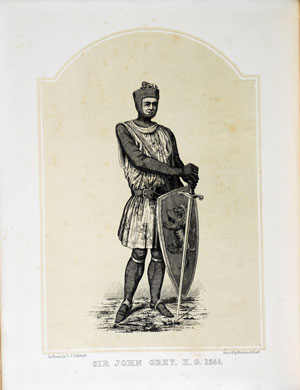
SIR JOHN GREY, K. G. 1350.

29. 4. Camden gives the name simply John Grey; Carte calls him John, Lord Gray, of Codenore; but Ashmole has it Sir John Grey, according to the following list. He says:—King Edward III. having instituted said order, and set down rules and statutes for the government and regulation thereof, he next resolved to elect, from the flower of his own chevalry, twenty-five noble and valiant knights, who, together with himself, should make up the number of 26, (for of so many doth the order by his appointment consist); and, indeed, that age furnished him with every choice of gallant men made famous by martial exploits performed in the battles of Sluce, Crescy, and Durham. The first that he elected into this noble order was Edward, his eldest son, who had already in part deserved, and afterwards obtained the title of a valiant and renowned prince; and the rest of those accomplished colleagues were these that follow, and thus placed in their stalls:— ON THE SOVEREIGN'S SIDE. ON THE PRINCE'S SIDE. 2. Henry, Duke of Lancaster. 2. Thomas, Earl of Warwick. 3. Piers, Capitow de la Bouch. 3. Ralph, Earl of Stafford. 4. William, Earl of Salisbury. 4. Roger, Earl of March. 5. Sir John Lisle. 5. Sir Bartholomew Burghersh. 6. Sir John Beauchamp. 6. Sir John Mohun. 7. Sir Hugh Courtney. 7. Sir Thomas Holland. 8. Sir John Grey. 8. Sir Richard Fitzsimon. 9. Sir Miles Stapleton. 9. Sir Thomas Wale. 10. Sir Hugh Wrottesley. 10. Sir Nele Loring. 11. Sir John Chandos. 11. Sir James Audeley. 12. Sir Otes Holland. 12. Sir Henry Earn. 13. Sir Sanchet Dabrichcourt. 13. Sir Walter Paveley. Of the aforesaid Sir John Grey, Ashmole gives the following account:—" He was eldest son of Richard, Lord Grey, of Codenore, in Derbyshire (by Jane his wife) who had been Seneschal of Gascoigne in the reign of King Edward the Second. In that notable and famous expedition made into Scotland, ananno 7 Edward III., he had command, when his valour was so far taken notice of, that not long after, the King in part of recompence thereof, and of his great expenses in those wars, acquitted him of all such debts as he then owed unto his exchequer. Towards the end of the 9th year of Edward III., he went again to the wars of Scotland, (being of the retinue of Hugh Audley), and two years after, in another expedition then made thither, anno 12 Edward III., he attended the King into Flanders, and, Anno 14 Edward III., went over thither, when by the way that famous naval fight happened near Sluce; the following year he undertook employment in the Scottish wars. Anno 18 Edward III., he, with Nicholas de Langford, and Edward de Chandos, were assigned to array all able men in Derbyshire, from 16 to 60 years of age, and to have them in readiness to march with them, or others whom the King should appoint, within three day's warning, against the Scots, then ready to invade this kingdom. The following year he went in the retinue of Henry, Earl of Derby, into Gascoigne; and in regard he stayed there the next year in the King's service, his lands in Kent were exempted from finding men

30. for guarding the sea-coasts. With this earl he returned to England, and went to Calais in his retinue, Anno, 21 Edward III, and stayed there the following year. There being an invasion threatened by the French, Anno, 26 Edward III., he was joined in commission with the Lord Deyncourt to array all able persons in Derbyshire and Nottinghamshire, and to conduct them to such places as might stand in need of them for defence of the realm. He went in the expedition which the aforesaid earl made into Bretagne, Anno 29 Edward III. ; and after attended the king on his voyage royal into France, Anno 33 Edward HI, and the same year was constituted governor of the town and castle of Rochester for life. More of his military services we find not before he obtained the King's license, Anno 39 Edward III, to go on pilgrimage ; and, Anno 45 Edward III, being grown very aged, and not able to endure travel, he obtained a special dispensation (wherein his many and great services performed with much fidelity and valour are by the King acknowledged), to exempt him coming to Parliaments, (to which he had received summons from the time of his father's death, which happened anno 1336), and councils, and charging him with setting forth of soldiers in the wars for the future. He married Alice de Insula, by whom he had Henry his eldest son, who married Joane, daughter of Reginald Cobham, of Sterborough, but died before his father, and John his second son, who both went in the retinue of John of Gaunt, Duke of Lancaster, in his expedition into France, anno 43 Edward III, and Alice a daughter, wife of William, son of Sir Adam de Everingham, of Laxton, in the County of Nottingham." The services of this nobleman were so highly esteemed by the king, that he received from the hands of the monarch himself a hood of white cloth, embroidered with blue men dancing, buttoned before with great pearls ; and being to perform divers military exercises in a tournament at Canterbury, had certain accoutrements of Indian silk, whereon the arms of Sir Stephen Cosyngton, Knight, were painted, bestowed on him by the king. He died about the year 1392, and was succeeded by his grandson Richard Lord Grey, who was also a Knjght of the Garter. His arms are—Barry of six, ar. and az. The first of the Greys of Northumberland who had conferred on him this honour (that of K.G.) was Sir John Grey, Earl of Tankerville, elected in the reign of Henry V. His arms are:—Gu. a lion rampant, within a border engrailed, ar. 5. This conspiracy happened at Southampton, whither Henry had come to embark his army, which was now ready to sail for France. Of this event the following account is given by Monstrelet:— Item ledit Roy d'Angleterre venu au port de Hautonne auec tout son exercite, prest pour passer la mer et venir descendre enFrace, fut aduerty, qu'aucuns grans seigneurs de son hostel si auoient fait cospiration a l'encontre de luy, vueillans remettre le Comte de la Marche vray successeur et inheritier de feu le Roy Richard en possession du royaume d'Angleterre, ce qui estoit veritable: car le Comte de Cantorbrye [Cambridge] et autres, auoient conclud de prendre le dessusdit Roy et ses freres, sur intention d'accomplir les besongnes dessusdictes: si s'en descouurirent au Comte de la Marche
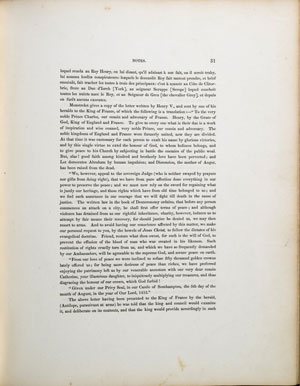
31. lequel reuela au Roy Henry, en lui disant, qu'il aduisast a son fait, ou il seroit trahy, lui nomma lesdits conspirateurs: lesquels le dessusdit Roy fait tantost prendre, et brief ensuiuat, fait tracher les testes a trois des principaux: c'est a ssauoir au Cote de Cator-brie, frere au Due dTorch [York], au seigneur Seruppe [Scrope] lequel couchoit toutes les nuicts auec le Roy, et au Seigneur de Grez [the chevalier Grey], et depuis en furet aucuns executez. Monstrelet gives a copy of the letter written by Henry V., and sent by one of his heralds to the King of France, of which the following is a translation:—" To the very noble Prince Charles, our cousin and adversary of France. Henry, by the Grace of God, King of England and France. To give to every one what is their due is a work of inspiration and wise counsel, very noble Prince, our cousin and adversary. The noble kingdoms of England and France were formerly united, now they are divided. At that time it was customary for each person to exalt his name by glorious victories, and by this single virtue to extol the honour of God, to whom holiness belongs, and to give peace to his Church by subjecting in battle the enemies of the public weal. But, alas! good faith among kindred and brotherly love have been perverted; and Lot dersecutes Abraham by human impulsion; and Dissension, the mother of Anger, has been raised from the dead. " We, however, appeal to the sovereign Judge (who is neither swayed by prayers nor gifts from doing right), that we have from pure affection done everything in our power to preserve the peace; and we must now rely on the sword for regaining what is justly our heritage, and those rights which have from old time belonged to us; and we feel such assurance in our courage that we will fight till death in the cause of justice. The written law in the book of Deuteronomy ordains, that before any person commences an attack on a city, he shall first offer terms of peace ; and although violence has detained from us our rightful inheritance, charity, however, induces us to attempt by fair means their recovery, for should justice be denied us, we may then resort to arms. And to avoid having our conscience affected by this matter, we make our personal request to you, by the bowels of Jesus Christ, to follow the dictates of his evangelical doctrine. Friend, restore what thou owest, for such is the will of God, to prevent the effusion of the blood of man who was created in his likeness. Such restitution of rights cruelly torn from us, and which we have so frequently demanded by our Ambassadors, will be agreeable to the supreme God, and secure peace on earth. "From our love of peace we were inclined to refuse fifty thousand golden crowns lately offered us; for being more desirous of peace than riches, we have preferred enjoying the patrimony left us by our venerable ancestors with our very dear cousin Catherine, your illustrious daughter, to iniquitously multiplying our treasures, and thus disgracing the honour of our crown, which God forbid ! " Given under our Privy Seal, in our Castle of Southampton, the 5th day of the month of August, in the year of Our Lord, 1415." The above letter having been presented to the King of France by the herald, (Antilope, pursuivant at arms) he was told that the king and council would examine it and deliberate on its contents, and that the king would provide accordingly in such

32. time and place as should seem good to him; and that he might return to his lord, the King of England, when he pleased. Monstrelet, in his account of the battle of Azincourt, makes mention of the Lord de Croy, of Picardy, and his son Sir John de Croy, as among those on the side of France, who were slain on that fatal day. Of the same family no doubt are the Greys, De Greys, and Grays of England and Scotland. 6. About this time the Greys were in possession of Wallington. It belonged, in 1326 and 1365, to John de Grey, who took the local name of de Wallington, and had a son "Robert de Wallington," whose only daughter and heir, Johanna, married William le Strother, on whose death it came with its dependencies to John de Fenwick, of Fenwick Tower, who married his youngest daughter and coheir, Mary, in the reign of Henry IV. John Grey de Walyngton is witness to a deed respecting Bywell, and dated at York, in 1318 (MS. Mat. L. 163). John de Walyngton and Elena his wife recovered 20 marks from Robert de Fenwick in 1343, and was a witness to deeds in 1342 and 1349 (III. ii. 16, 17). John, son of John de Walyngton, gave 10 marks, 34 Edward III., for forfeited lands in Greenleighton and Middleton Morel (Abb. Rot. Orig. ii. 261, Cal. Rot. Pat, 171); and Robert de Walyngton, next of kin and heir of John de Walyngton, quiet-claimed to John de Fenwick, Esq., all his right in the manor of Camboe in 1393. Thomas Grey occurs as a witness to Wallington deeds in 1358 and 1393 (P. 6, 7). Emmotta Grey and her son, John de Herle, burgess of Newcastle, 16th May, 1393, released to John del Strother all arrearages due from Wallington and Heugh. The Greys, indeed, have been located, or held lands, more or less all over the county of Northumberland, at different places; to wit: Heton, Horton, Chillingham, Werke, Howick, Norham, Holy Island, Falloden, Ancroft, Kelloe, Rosse, Elwick, Goswick, Cornhill, Beale, Lowlyn, Bradford, Buckton, Twisell, Fenwick (N. D.), Milfield, Morwick, Nesbit, Doddington, Chiswick, North and South Middleton, Duddo, Tweedmouth, Murton, Heddon, Brunton, Alnwick, Wallington, Stanton, Stannington, Nunny Kirk, Angerton, Longhorsley, Morpeth Castle, Newminster Abbey, Broom Hill, Beechfield, Chevington^ West Ord, Budle, &c, &c. 7. The judgment 'pronounced against Sir Ralph Graye, of Warke, for treason in the fourthe year of King Edward the Fourth. The Earle of Worchester, Constable of England, sate in judgement, who remem-bring him saying, Sir Ralphe Graye thou hast taken order of knighthood of the Bathe, and anie taking that order ought to keep his faith which he maketh therefore, therefore, remember thee the lawe will that thou shallt proceed to Judgement, these matters shew so evidentlie against thee, that there needeth no further examination, certaine persones of the king's true subjects thou hast lefte wounded, as it seemeth here thou canst not denie this, thou hast drawen them with force of Armes unto the kings our dread Souveraignes Mortell enemies, and ranged thee in battaile against thy oath and faith which thou madest with thy owne voluntarie will against the Matie. of our most naturall Souveraigne, the which thou wotest well, gave unto thee such trust, and in such wise ministred his grace unto thee that thou haddest the keeping of his castels in the North partes.
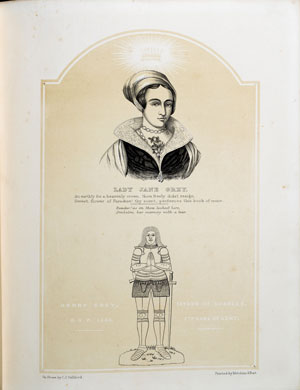
LADY JANE GREY
An earthly for a heavenly crown, thou freely didst resign.
Sweet flower of Paradise! thy scent, perfumes this book of mine.
Reader! as on thou lookest here,
Embalm her memory with a tear.
HENRY GREY O.V.P. 1545
FATHER OF CHARLES GREY OF KENT.

33. Thou hast betraied Sir John Ashelle, knight and brother of the Garter, the which, remaineth in the kings our Souveraigne Lords enemies in France. Item, thou hast withstood and made forces against the kings Matie- and his Lieutenant the worthie Lord my Brother Warwicke, it appeareth by the great goones in the walles of the king's Castelles of for these causes dispose thyself to die by repentance according to the lawe. The king had ordained that thou shouldest have had thy sporres stricken of by thy heeles with the handes of the Maister Cooke who is here present readie to do as was promised at the time he tooke of the sporres, and said unto thee as is accustomed that, and if thou be not true to thy Souveraigne, he shall smite of thy sporres with his knife hard by thy heeles, and shewed him the Maister Cooke readie to doe his office with apron and knife. Item, Sir Ralphe Graye, the king had ordeined here thou maiest see the King of Armes and Harouldes, and thy owne proper Coates of Armes, which he should teare of thy backe and bodie, and so thou shouldest be disgraded of thy worshipp, Noblenes, and armes, as of the order of knighthood, also here is another coate of thy armes reversed, which thou shouldest have worne on thy bodie going to that death ward for that belongeth to thee after the lawe, notwithstanding the degradinge of knighthood, of the Noblenes, and of the armes, the king pardoneth that for thy Nobell Grandfather, who suffered trouble for the king's most Noble Predecessours. Now Sir Ralphe Graye this shalbe thy penaunce, thou shallt goe on thy feete to the Townes ende, and there thou shallt be laid uppon a hurdle, and drawen to a scaffold made for thee, and thou shallt have thy head smiten of from thy bodie, and it to be buried in the friers, thy head where the king's pleasure shall be.—Copied from GUTHRIE'S MSS. 8. Letter from Lord Grey to General Fairfax, 1645. Hoble Sir, The Lords the Peers in Parlement having taken especiall notice by yr letter, of so intire a victory, commande me to signify unto you in ther names, that next to the power of God they must attribute much to your great courage and gallant conduct for which they must ever hold you in theire dearest esteeme. For my pticuler, I am a true lover of your vertue. Your most affectionate friend, GREY, of Warke, speaker Westminster, June 23. of the House of Peers. For the honble Sr- Tho. Fairfax Comander in cheife of the Parlement forces this. Copied from the original MS. in Dr. BIRCH'S Collection. 9. In that era of plots and political intrigues, comprised in the reigns of the later Stuarts, Forde, Lord Grey, afterwards Earl of Tankerville, was a very busy and adventurous personage. He took part in the rebellion of the Duke of Monmouth, and commanded the horse at the battle of Sedgmoor, where he is accused of having treacherously deserted his post, and of flying at the first charge ; relative to which

34. historians have been divided as to whether it was the result of treachery or cowardice. The strict entail in which his estates were bound, aided by his skill in administering effectual presents, is supposed to have saved his life ; after his estates in anticipation had been already given (though they proved beyond reach) to the Earl of Rochester. This memorable passage in his history eclipsed the fame of his previous concern in the celebrated Rye House Plot; but a memoir he had himself written of that affair having been preserved in manuscript until 1754, was then printed and published. When on his way to the Tower on that occasion, he appears to have {made his escape in a very extraordinary manner, to which he only briefly alludes in the memoir, but what he has omitted, Badesley, in his "Genealogia Diversa, &c." (one of the Harl. MSS.), has supplied as follows: " June 27th, 1683. " This morning, about 7 of ye clock in the morning, the Lord Grey being brought to the Tower in a coach by Sarjt. Deerham ; the coach stopping at the Bulworke Gate, my Ld. found the Sargt. asleepe, who not wakeing upon my Lord's jogging of him, the coachman knowing nothing of the matter, suffer'd my Lorde to come out of the coach, and walked away, leaving the Sarjt. sleeping, and one or two of owne servts. standing by the coach side; he tooke water at Sab-staires, neare the Custom House, and landed at a place called Pickled-herring on the other side; but, before they landed him, they were followed by a soldier in a boate, who called out to them to stopp a Traytr to the King and country, upon which they stopped till the soldier came up to them; but immediately he said, it is not the man, and after whispering a littel, they went away together. The soldier's name is Robt. Clinton, of Capt. Delaval’s company. The waterman that tooke him up is named Thos. Heed, and is in custody upon the guard at ye Tower." Lord Grey, when he made his escape, was on his way to the Tower, after having been examined before the King and council. His own remark on the subject is this : " The escape I made none can imagine I foresaw, unless they will suppose I had the spirit of divination, or had agreed with the messenger for it, which I protest to God I had not, nor ever proposed it to him." He got clear off to Holland. On the accession of William III, Lord Grey was restored to his former honours, and afterwards created by patent, dated 11th May, 1695, Viscount Glendale and Earl of Tankerville. In 1699 he was made a Lord of the Treasury, and in the same year, on the death of the Viscount Lansdowne, he became Lord Privy Seal. He died in 1701, and was buried at South Harting, in Sussex, where his coffin was seen by the late Sir William Burrell, bearing the following inscription: "N, " The body of the Right Honble Lord Grey, Earl of Tankerville, Viscount Glendale, Baron Grey, of Werke, and Baronet, Lord Privy Seal, and one of the Lords of his Majesty's most Honble Pnvy Council, who died the 24th of June, 1701, in the 47th year of his age." Arms : quarterly, a lion rampant within a bordure engrailed, and three lions rampant, under a coronet, similar to that now assigned to a Marquis. The same arms, with a baron's coronet, were on his brother's coffin-plate with this inscription :
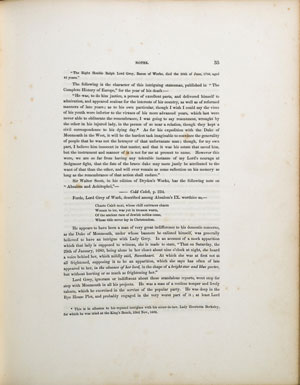
35. "The Right Honble Ralph Lord Grey, Baron of Werke, died the 20th of June, 1706, aged 45 years." The following is the character of this intriguing statesman, published in " The Complete History of Europe," for the year of his death:— "He was, to do him justice, a person of excellent parts, and delivered himself to admiration, and appeared zealous for the interests of his country, as well as of reformed manners of late years; as to his own particular, though I wish I could say the vices of his youth were inferior to the virtues of his more advanced years, which last were never able to obliterate the remembrance, I was going to say resentment, wrought by the other in his injured lady, in the person of so near a relation, though they kept a civil correspondence to his dying day.* As for his expedition with the Duke of Monmouth in the West, it will be the hardest task imaginable to convince the generality of people that he was not the betrayer of that unfortunate man; though, for my own part, I believe him innocent in that matter, and that it was his estate that saved him, but the instrument and manner of it is not for me at present to name. However this were, we are so far from having any tolerable instance of my Lord's courage at Sedgmoor fight, that the fate of the brave duke may more justly be attributed to the want of that than the other, and will ever remain as some reflection on his memory as long as the remembrance of that action shall endure." Sir Walter Scott, in his edition of Dryden's Works, has the following note on " Absalom and Achitophel," Cold Caleb, p. 234. Forde, Lord Grey of Wark, described among Absalom's IX. worthies as, Chaste Caleb next, whose chill embraces charm s Women to ice, was yet in treason warm, Of the ancient race of Jewish nobles come, Whose title never lay in Christendom. He appears to have been a man of very great indifference to his domestic concerns, as the Duke of Monmouth, under whose banners he enlisted himself, was generally believed to have an intrigue with Lady Grey. In an account of a mock apparition which that lady is supposed to witness, she is made to state, " That on Saturday, the 29th of January, 1680, being alone in her closet about nine o'clock at night, she heard a voice behind her, which mildly said, Sweetheart. At which she was at first not at all frightened, supposing it to be an apparition, which she says has often of late appeared to her, in the absence of her lord, in the shape of a bright star and blue garter, but without hurting or so much as frightening her." Lord Grey, ignorant or indifferent about these scandalous reports, went step for step with Monmouth in all his projects. He was a man of a restless temper and lively talents, which he exercised in the service of the popular party. He was deep in the Rye House Plot, and probably engaged in the very worst part of it; at least Lord * This is in allusion to his reputed intrigues with his sister-in-law, Lady Henrietta Berkeley, for which he was tried at the King's Bench, 23rd NOV., 1682.

36. Howard deposed that Grey way full of expectation of some great thing to be attempted on the day of the king's coming from Newmarket, which was that fixed by the inferior conspirators for his assassination. Upon the trial of Lord Russell, Howard was yet more particular, and said, that upon a dark intimation of an attempt on the King's person, the Duke of Monmouth, " with great emotion struck his breast, and cried out, God so ! kill the king! I will never suffer them? That Lord Grey, with an oath, also observed upon it, " that if they made such an attempt, they could not fail." Ramsay charged Lord Grey with arguing with Ferguson on the project of rising at Taunton. Grey, on the first discovery of this conspiracy, was arrested, but finding the ofiicers drunk, he escaped in a boat, and fled into Holland. He was afterwards very active in pushing on Monmouth to his desperate expedition in 1685. He landed with the duke at Lyme, and held the rank of general of horse in his army. Like many other politicians, his lordship proved totally devoid of that courage in executing bold plans, which he displayed in forming or abetting them. At the first skirmish at Bridport he ran away, although the troops he commanded did not follow his example, but actually gained a victory, while he returned on the gallop to announce a total defeat. Monmouth, much shocked, asked Colonel Matthews what he should do with him ? who answered, he believed there was not another general in Europe would have asked such a question. Lord Grey, however, fatally for Monmouth, continued in his trust, and commanded the horse at the battle of Sedgmoor. There he behaved like a poltroon as formerly, fled with the whole cavalry, and left the foot, who behaved most gallantly, to be cut to pieces by the horse of King James, who, without amusing themselves with pursuit, wheeled and fell upon the rear of the hardy western peasants. So infamous was Grey's conduct, that many writers at the time, thinking mere cowardice insufficient to account for it, have surmised, some that he was employed by the king to decoy Monmouth to his destruction, and others, that jealousy of the domestic injury he had received from the duke induced him to betray the army.* This caitiff peer was taken in the disguise of a shepherd, near Holt Lodge, in Dorsetshire, and confessed that, " since his landing in England, he had never enjoyed a quiet meal, or a night's repose." He was conveyed to London, and would probably have been executed, had it not been discovered that his estate, which had been given to Lord Rochester, was so strictly entailed that nothing could be got by his death. He, therefore, by the liberal distribution, it is said, of large sums of money, received a pardon from the king, and appeared as a witness on the trial of Lord Delamere; and was ready to do so on that of Hampden; yet he is supposed to have kept some secrets with respect to the politics of the Prince of Orange, in reward of which, he was raised to the rank of an earl after the revolution.+ * Next, Monmouth came in with an army of fools, Betray'd by his cuckold and other dull tools, Who painted the turf of green Sedgemoor with gules. + Whatever difference of opinion others may have entertained of this heterogeneal fungus on the Grey stock, the late Earl Grey (who happily inherited not a drop of his degenerate blood)

37. 10. There is, in the county of Durham, a curious tradition of the son and heir of this Charles Bennet, the particulars of which, as related in a recent memoir of the Allan family, are as follows :—In the early part of the last century, Edward Colville, who had realised a handsome fortune as a wholesale butcher and extensive grazier, resided in a mansion called the White House, which may still be seen in the vicinity of Gateshead. The respectability of his character and the style in which he lived were such as to admit of his daughter, Camilla, attending the assize balls in Newcastle-on-Tyne; and gifted by nature with an elegant person, and with the advantages of education, she was a young lady eminently qualified to grace those scenes of gaiety and fashion; at one of which she had the good fortune to attract the attention of a young nobleman, Lord Ossulston, heir apparent of the house to Tankerville. Camilla was the envied object of her less favoured rivals, when this nobleman, after the proper formalities, solicited the honour of walking a minuet with her. She blushingly consented, and rarely had the company present witnessed a more striking display than that which this elegant couple, in their evolutions of graceful movement, exhibited. Lord Ossulston was charmed above measure by the beauty of his partner, and the next day beheld the future lord of Chillingham, at an hour which would now be thought preposterously early, calling at the White House to pay his respects to its fair tenant. Next day, and the next again, he renewed his visits; and the young lady's father, from being simply flattered, began to fear that a sentiment of love might arise in their unwary hearts, and engender hopes that would end only in disappointment. Perhaps he had even graver fears, which any one acquainted with the maxims of the parents of that age will not deem to have been at all unreasonable, when the fact is known that Camilla's sweet teens of youth and innocence had four more years to run. He, therefore, made some efforts to prevent all intercourse between Lord Ossulston and his daughter; but, denied admittance to the house, the ardent lover still could beset her when she went abroad, seat himself near her at church, and get insinuated into any little social party where she was expected. Mr. Colville at length saw it to be necessary to take very decided measures, and he resolved to place the young lady for some time in a new and distant home, where her sister, who was eight years older, might be a proper guardian. Mr. Lionel Allan, his son-in-law, had settled as a merchant in Holland, and he had also a friend who conducted a vessel of his own regularly between South Shields and the ports of Holland and the north of France. It may here be remarked that the shipowners, who in those days navigated their own vessels from the Tyne, were a highly respectable class of men, generally possessing good education and manners, and living, when at home, in a style of considerable dignity. Amongst the descendants of some of them might be found members of both Houses of Parliament. They took the name of Captain, and had some valid pretensions for doing so, as trading beyond certain latitudes and longitudes, specified by Queen Elizabeth, gave masters of merchant
would hear nothing in his favour ; but, when talking about him with a friend of mine, characterized him with indignant emphasis, "a great rascal." Certainly between the two men there was no imaginable point of resemblance; they were as unlike as Satyr to Hyperion.—E. H.

38. vessels a modified permission to assume that title. Captain Aubane (of the family of Aubane, of Great Yarmouth, not Aubone of Newcastle) readily entered into the views of his friend Colville, and undertook the expatriation of the young lady. She was accordingly conducted, in the most private manner to South Shields, and put on board his vessel; for if, as is likely, she regarded her lover with affection, and deemed her deportation a compulsory exile, the authority of parents in those days was too stern and inflexible to admit of anything like effectual remonstrance on her part. The ship arrived at Rotterdam in safety, having on board Camilla, who was duly consigned to the care of her brother-in-law, Mr. Lionel Allan. If Mr. Colville, however, believed that Lord Ossulston had been " thrown out," he was mistaken, for, after the lapse only of a few weeks, his Lordship made his appearance in Rotterdam, and became as troublesome to Mr. Allan's family, who had charge of his mistress, as he had formerly been to her father. The Linden Walks lent their shade to meetings of the lovers; and, when such were denied, his Lordship made signals from the street, which Camilla could furtively read in the friendly mirror projecting from the parlour window. Mr. Allan now became more distressingly alarmed than even the father had been, and resolved to get quit of his onerous charge. Captain Aubane ere long returned to Rotterdam for another cargo, and Camilla was once more put on board. The Dutch coast had been for a day lost in the blue distance, and honest Aubane was congratulating himself on the prospect of soon committing Miss Colville in safety to her father's keeping, when, descending into the cabin, how was he astonished to behold, kneeling at her feet, that very Lord Ossulston whom he supposed to have been left lamenting on the quay of Rotterdam! He soon learnt that the lover had contrived, by the connivance of a sailor, and doubtless with the concurrence of his mistress, to secrete himself in a cask on board the vessel shortly before it sailed. It was too late to think of returning to port to put the intruder ashore; but Captain Aubane commanded him to withdraw from the cabin, and not to appear there again, unless in his company and by his express permission. He also stipulated that, while he himself was on deck on duty, Lord Ossulston should, both day and night, be at all times under his immediate surveillance. The lover found himself compelled to submit to all these restrictions; but the privilege of seeing his mistress once a day, even in the presence of a third party, served in no small degree to reconcile him to their strictness. In the course of the voyage, which was not a short one, the heir of Tankerville made a more favourable impression on the mind of Aubane, who became convinced that, however frivolous or otherwise objectionable might have been the feelings with which he at first had regarded Camilla, he was now actuated by an honourable motive. He was also induced to believe the young man when he protested, in the most earnest manner, that his future felicity depended on his obtaining her who alone could make him happy. The South Shields shipowner did not, indeed, like the idea of encouraging a young nobleman in a design which must be regarded with dislike by his father and other relatives; but, on this point also, his scruples were at length overcome, doubtless by persuasions strictly honourable. On arriving at South Shields, he allowed Lord Ossulston to become an inmate of his house,, in company with Camilla, until the consent of her father was
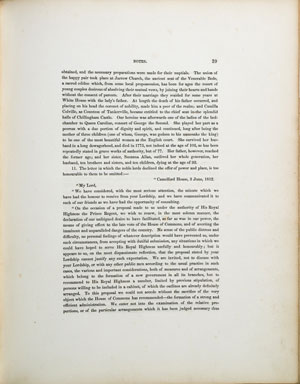
39. obtained, and the necessary preparations were made for their nuptials. The union of the happy pair took place at Jarrow Church, the ancient seat of the Venerable Bede, a sacred edifice which, from some local prepossession, has been for ages the resort of young couples desirous of absolving their mutual vows, by joining their hearts and hands without the consent of parents. After their marriage they resided for some years at White House with the lady's father. At length the death of his father occurred, and placing on his head the coronet of nobility, made him a peer of the realm; and Camilla Colville, as Countess of Tankerville, became entitled to the chief seat in the splendid halls of Chillingham Castle. Our heroine was afterwards one of the ladies of the bedchamber to Queen Caroline, consort of George the Second. She played her part as a peeress with a due portion of dignity and spirit, and continued, long after being the mother of three children (one of whom, George, was godson to his namesake the king) to be one of the most beautiful women at the English court. She survived her husband in a long dowagerhood, and died in 1775, not indeed at the age of 105, as has been repeatedly stated in grave works of authority, but of 77. Her father, however, reached the former age; and her sister, Susanna Allan, outlived her whole generation, her husband, ten brothers and sisters, and ten children, dying at the age of 92. 11. The letter in which the noble lords declined the offer of power and place, is too honourable to them to be omitted: " Camelford House, 3 June, 1812. " My Lord, "We have considered, with the most serious attention, the minute which we have had the honour to receive from your Lordship, and we have communicated it to such of our friends as we have had the opportunity of consulting. " On the occasion of a proposal made to us under the authority of His Royal Highness the Prince Regent, we wish to renew, in the most solemn manner, the declaration of our unfeigned desire to have facilitated, as far as was in our power, the means of giving effect to the late vote of the House of Commons, and of averting the imminent and unparalleled dangers of the country. No sense of the public distress and difficulty, no personal feelings of whatever description would have prevented us, under such circumstances, from accepting with dutiful submission, any situations in which we could have hoped to serve His Royal Highness usefully and honourably; but it appears to us, on the most dispassionate reflection, that the proposal stated by your Lordship cannot justify any such expectation. We are invited, not to discuss with your Lordship, or with any other public men according to the usual practice in such cases the various and important considerations, both of measures and of arrangements, which belong to the formation of a new government in all its branches, but to recommend to His Royal Highness a number, limited by previous stipulation, of persons willing to be included in a cabinet, of which the outlines are already definitely arranged. To this proposal we could not accede without the sacrifice of the very object which the House of Commons has recommended—the formation of a strong and efficient administration. We enter not into the examination of the relative pro-portions, or of the particular arrangements which it has been judged necessary thus

40. previously to establish ; it is to the principle of disunion and jealousy that we object to the supposed balance of contending interests in a cabinet so measured out by preliminary stipulation. The times imperiously require an administration united in principle, and strong in mutual reliance, possessing also the confidence of the Crown, and assured of its support in those healing measures which the public safety requires, and which are necessary to secure to the government the good opinion and affections of the people. " No such hope is presented to us by this project, which appears to us equally new in practice and objectionable in principle; it tends, as we think, to establish within the cabinet itself a system of counteraction, inconsistent with the prosecution of any uniform and beneficial course of policy. We must, therefore, request permission to decline all participation in a government constituted on such principles; satisfied, as we are, that the certain loss of character which must arise from it to ourselves, could be productive only of disunion and weakness in the administration of the public interests. We have the honour to be, with respect, &c, "GREY, " The Most Hon. the Marquis Wellesley." " GRENVILLE. -
Families that have in them the blood of the Greys, being descended from Sir Thomas Grey, of Heton, Northumberland:— DUKES. Norfolk, Beaufort, Richmond, Bedford, Newcastle (Cavendish), Northumberland, Devonshire, Marlborough, Kent, Buckingham, Shrewsbury, Bridgewater, Wharton, St. Albans, Argyll, Lennox, Albemarle, Montagu, Atholl, Newcastle (Clinton), Berwick, Rutland, Bolton, Dorset, Montrose, Buccleuch, Portland, Sutherland, Cleveland, Leinster, Grafton, Roxburghe.
MARQUISES. Exeter, Lansdowne, Normanby, Ailesbury, Bath, Downshire, Londonderry Cholmondeley, Westmeath, Westminister, Salisbury, Waterford, Conyngham, Anglesey, Bristol, Drogheda, Abercorn, Bute, Hertford, D'Escars, De Reul, De Bonzels, Margrave of Brandenburg, Anspach, and Bavreuth de Chevigne

41. EARLS. Grey, De Grey, Tankerville, Durham, Carlisle, Granville, Burlington, Clarendon, Albemarle, Bandon, Darnley, Newborough, Enniskillen, Delaware, Newburgh, Grandison, Leicester, Plymouth, Granard, Tyrconnel, Harewood, Arran, Craven Northampton, Rockingham, Sefton, Courtown, Romney, Devon, Oxford, Breadalbane, Sunderland, Sandwich, Leicester, Kildare, Ashburnham, Coningsby, Essex, Rocheford, Berkeley, Bathurst, Lisburne, Chesterfield, Chatham, Derwentwater, Beverley, Lonsdale, Portsmouth, Talbot, Onslow, Harborough, Carnarvon, Howe, Lucan, Bellamont, Cullen, Cavan, Amherst, Middlesex, Cadogan, Westmoreland, Thanet, Shaftesbury, Upper Ossory, Waldegrave, Desart, Candor, Galloway, Harrowby, St. German's, Bath, Powis, Radnor, Winchilsea, Fife, Mexborough, Fortescue, Gainsborough, Mountnorris, Clonmell, Bolingbroke, Abergavenny, Anglesey, Abing¬don, Brooke and Warwick, Bridgewater, Besborough, Egmont, Arundel, Brownlow, Aylesford, Chichester, Fitzhardinge, Harrington, Stamford, Cardigan, Dysart, Athlone, Buckinghamshire, Mansfield, Macclesfield, Seaforth, Roden, Home, B anymore.
VISCOUNTS. Barrington, Bulkeley, Savage, Dungannon, Galway, Clifden, Hillsborough, May-nard, Courtenay, Scudamore, Irwin, Scroop, Dunbar, Chaworth, Sydney, De Chabot, Count Danieskiold Samsoe.
BARONS. Grey, of Rolleston, De Clifford, Prudhoe, Chandos, Vaux, Brougham, Carteret, Bolton, Raglan, Henley, Grantham, Kensington, Foley, Monson, Bexley, Brereton, Middleton, Kinnaird, Crofton, Douglas, Dynevor, Montagu, Lechmere, Fairfax, Stourton, Mountflorence, Ranelagh, Ogle, Mostyn, Rivers, Beauchamp, Langdale, Templemore, Petre, Dinorben, Blantyre, Clonbrock, Vernon, Lilford, Sandys, Hepple, Strafford, Downe, Bridport, Southampton, Barham, Ligonier, Holland, Radstock, Farnham, Dacre, Stuart de Decies, Combermere, Bagot, Sondes, Manners, Capel, De Selby, Canterbury, Littleton, Forester, Wrottesley, Audley, Hastings, De Lisle and Dudley, Dunfermline, Ponsonby, Farnborough, Braybrooke, Howard de Walden, Wharncliffe, Arundel, Carrington, Wenlock, Napier, De Mauley, Churchill, Delaval, Carbery, Le Despencer, Powerscourt, Redesdale, Hatherton, Godolphin, De Ros, De Malmsbury, De Jarnac, De Montfaucon, De Fontenelle, De Starck, De Mondreville, Nieuman Knyff.
ARCHBISHOPS. i Canterbury, York, Cashel.
BISHOPS. Durham, Oxford, Bath and Wells, Lichfield, Bangor, Hereford, Carlisle, Exeter, Norwich, Peterborough, Rochester, Llandaff, Kilmore, Sodor and Man.
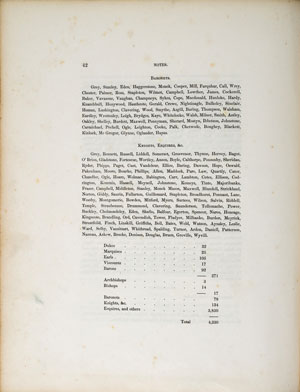
42. BARONETS. Grey, Stanley, Eden, Haggerstone, Monck, Cooper, Mill, Farquhar, Call, Wrey, Chester, Palmer, Eoss, Stapleton, Wilmot, Campbell, Lowther, James, Cockerell, Baker, Vavasour, Vaughan, Champneys, Sykes, Cope, Macdonald, Hunloke, Hardy, Knatchbull, Honywood, Heathcote, Gerald, Crewe, Nightinagle, Bulkeley, Sinclair, Homan, Lushington, Clavering, Wood, Smythe, Asgill, Baring, Thompson, Walsham, Eardley, Wrottesley, Leigh, Brydges, Kaye, Whitelocke, Walsh, Milner, Smith, Astley, Oakley, Shelley, Burdett, Maxwell, Pennyman, Sherard, Mostyn, Ibbetson, Johnstone, Carmichael, Pechell, Ogle, Leighton, Cooke, Palk, Chetwode, Boughey, Blackett, Kinlock, Me Gregor, Glynne, Oglander, Hayes.
KNIGHTS, ESQUIRES, &C. Grey, Bennett, Russell, Liddell, Somerset, Grosvenor, Thynne, Hervey, Bagot, O' Brien, Gladstone, Fortescue, Wortley, Anson, Boyle, Calthorpe, Ponsonby, Sheridan, Ryder, Phipps, Paget, Cust, Vandeleur, Ellice, Baring, Dawson, Hope, Oswald, Pakenham, Moore, Bourke, Phillips, Allen, Maddock, Pare, Law, Quartly, Cator, Chandler, Ogle, Hoare, Welman, Babington, Carr, Lambton, Cotes, Ellison, Codrington, Kemmis, Hassell, Meynell, Johnstone, Kemeys, Tinte, Majoribanks, Fraser, Campbell, Middleton, Stanley, Monck Mason, Maxwell, Blundell, Strickland, Norton, Giddy, Saurin, Fullarton, Guillemard, Stapleton, Broadhurst, Pennant, Lane, Westby, Montgomerie, Bowden, Mitford, Myers, Surtees, Wilson, Salvin, Riddell, Temple, Straubenzee, Drummond, Clavering, Saunderson, Tollemache, Power, Buckley, Cholmondeley, Eden, Shafto, Balfour, Egerton, Spencer, Nares, Heneage, Kingscote, Brandling, Ord, Cavendish, Tower, Fludyer, Milbanke, Burdon, Meyrick, Streatfeild, Finch, Linskill, Griffiths, Bell, Bates, Weld, Watson, Aynsley, Leslie, Ward, Selby, Vansittart, Whitbread, Spalding, Turnor, Arden, Daniell, Patterson, Nannau, Askew, Brooke, Denison, Douglas, Bruen, Greville, Wyvill.
Dukes . .32, Marquises . .25, Earls ..105 Viscounts . .17, Barons .. 92, 271, Archbishops.. 3, Bishops . . 14, 17, Baronets .. 78 ,Knights, &c... 34, Esquires, and others . . 3 830, Total 4,330.
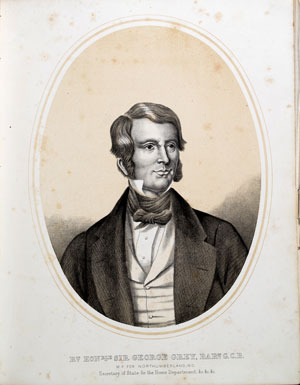
RT. HONBLE. SIR GEORGE GREY, BART. G.C.B.
M.P. FOR NORTHUMBERLAND
Secretary of State for the Home Department etc. etc. etc.
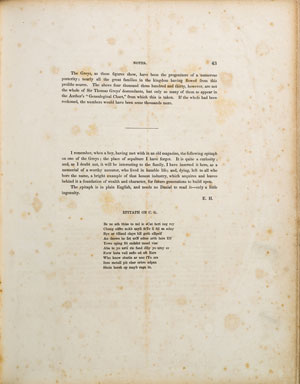
43. The Greys, as these figures show, have been the progenitors of a numerous posterity; nearly all the great families in the kingdom having flowed from this prolific source. The above four thousand three hundred and thirty, however, are not the whole of Sir Thomas Greys' descendants, but only so many of them as appear in the Author's " Genealogical Chart," from which this is taken. If the whole had been reckoned, the numbers would have been some thousands more.
I remember, when a boy, having met with in an old magazine, the following epitaph on one of the Greys ; the place of sepulture I have forgot. It is quite a curiosity; and, as I doubt not, it will be interesting to the family, I have inserted it here, as a memorial of a worthy ancestor, who lived in humble life; and, dying, left to all who bore the name, a bright example of that honest industry, which acquires and leaves behind it a foundation of wealth and character, for future generations to build upon. The epitaph is in plain English, and needs no Daniel to read it—only a little ingenuity. E H.
EPITAPH ON C. G.
Be ne ath thiss to nel ie sCat heri neg rey
Chang edfro mAb usyli feTo li. fel es sclay
Bye ar tHand clays hE goth eRpelf
An dnows he 1st urN edtoe arth hers Elf
Yewe eping fri endslet mead vise
Aba te yo urG rie fand dRy yo urey es
Forw hata vail saflo od oft Ears
Who know sbutin ar uno fYe ars
Inso metall pit cher orbro adpan
Shein hersh op mayb eaga in.
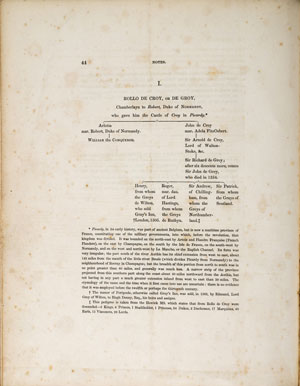
44. ROLLO DE CROY, OR DE GROY, Chamberlayn to Robert, Duke of NORMANDY, who gave him the Castle of Croy in Picardy*
Arlotta mar. Robert, Duke of Normandy. WILLIAM the CONQUEROR.
John de Croy mar. Adela FitzOsbert. Sir Arnold de Croy, Lord of Walton-Stoke, &c. Sir Richard de Grey; after six descents more, comes Sir John de Grey, who died in 1354.
Henry, from whom the Greys de Wilton, who sold Gray's Inn, +London, 1505.
Roger, mar. dau. of Lord Hastings, from whom the Greys de Ruthyn.
Sir Andrew, of Chillingham, from whom the Greys of Northumber- land (1)
Sir Patrick, from whom the Grays of Scotland.
* Picardy, in its early history, was part of ancient Belgium, but is now a maritime province of France, constituting one of the military governments, into which, before the revolution, that kingdom was divided. It was bounded on the north-east by Artois and Flandre Francaise (French Flanders), on the east by Champagne, on the south by the Isle de France, on the south-west by Normandy, and on the west and north-west by La Manche, or the English Channel. Its form was very irregular; the part south of the river Authie has its chief extension from west to east, about 145 miles from the mouth of the little river Bresle (which divides Picardy from Normandy) to the neighbourhood of Rocray in Champagne; but the breadth of this portion from north to south was in no point greater than 60 miles, and generally was much less. A narrow strip of the province projected from this southern part along the coast about 50 miles northward from the Authie, but not having in any part a much greater extension inland from west to east than 50 miles. The etymology of the name and the time when it first came into use are uncertain : there is no evidence that it was employed before the twelfth or perhaps the thirteenth century.
+ The manor of Portpoole, otherwise called Gray's Inn, was sold, in 1505, by Edmund, Lord Grey of Wilton, to Hugh Denny, Esq., his heirs and assigns.
(1) This pedigree is taken from the Howick MS. which states that from Rollo de Croy were descended—3 Kings, 4 Princes, 1 Stadtholder, 1 Princess, 24 Dukes, 2 Duchesses, 17 Marquises, 48 Earls, 15 Viscounts, 28 Lords.
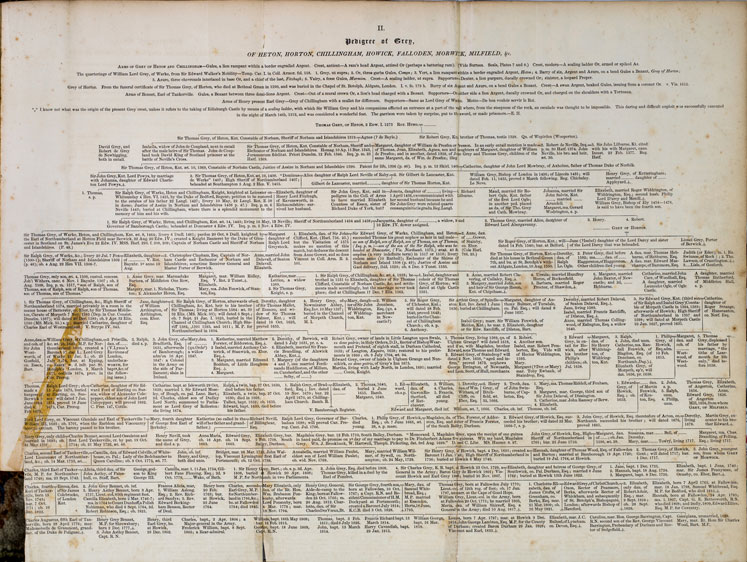

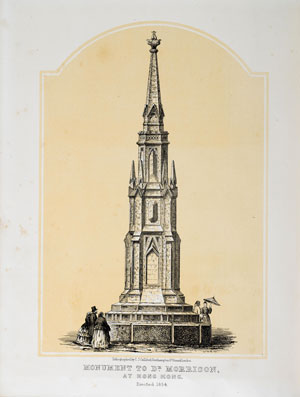
MONUMENT TO Dr. MORRISON
AT HONG KONG Erected 1854
47. Issue of JOHN GREY of Dilston and West Ord.* I George-Annett Grey, of Milfield, born 12th December, 1816; married, 1839, Elizabeth-Boyd Niel, and by her has issue—1, Elizabeth-Niel; 2, Jane-Eliza; 3, John-George, born 31st March, 1844; 4, Hannah-Mary; 5, Georgina, died young; 6, Robert-Charles, died young; 7, George-Grey, born March, 1850; 8, Charles died young. Mr. G. A. Grey is in the commission of the peace and a Deputy Lieutenant for the county of Northumberland. II. John Henry. III. Hannah-Eliza, married William Morrison,+ M.D., died at Hong Kong 13th October, 1853, leaving her a widow with four children,
* Mr. Grey had a brother and two sisters: 1, Margaretta, married to the Rev. Henry Grey, D.D., Edinburgh; 2, Mary, the wife, first of the Rev. R. Lundie, second, of the Rev. Dr. Duncan, Ruthwell, N.B.; 3, George, who married Jane Gregson.
Mr. Grey is a J. P. for the counties of Northumberland and Durham, and has for many years had charge of the Greenwich Hospital estates in the North; in the management of which he has so equitably adjusted the relative interests of landlord and tenant as to have gained the approbation and confidence of both ; but which he has not more effectually done than he has, with the ploughshare of improvement, uprooted from the mental soil of obstructive ignorance the antiquated notions of prejudice and custom, and sown therein the seeds of a new and better system, which shall spring up and flourish long after its author shall have disappeared from that constellation of northern lights in the firmament of agriculture, of which, for nearly half a century, he was the guiding star. He was among the first to call into existence and actively promote those local associations which, by a more extensive diffusion of useful knowledge, have rendered to agriculture such valuable service. Agriculture, indeed, is greatly indebted to Mr. Grey; he has devoted his whole life to it; in doing which he has kept pace with the march of intellect, and advanced with the times ; he has called in science to the aid of nature; and, by an enlightened application of their united agency, skilfully conducted, he has caused the earth that was barren before to bring forth her increase a hundredfold; thus more than realizing the public virtue of the ancient utilitarian who boasted that he had made twenty blades of grass to grow where previously there was but one.
+ The following notice of this gentleman's death appeared in one of the colonial prints at the time of his decease:— " It is with feelings of deep regret that we place in our obituary the name of William Morrison, Esq., F.R.C.S., who died on the morning of the 13 th instant, from abscess in the liver, after an illness of seven weeks. Mr, Morrison was appointed by the Home Government as surgeon of this colony, and arrived in November, 1847, when he entered upon the duties of his office ; and from that period, up to the commencement of his fatal illness, his services met the entire and cordial approval of the Local Government. To a very thorough knowledge of his profession, Mr. Morrison joined an ease and freedom of manner, a warmth of heart and amiability of disposition, which endeared him to all who had the pleasure of his acquaintance. Mr. Morrison was born on the 12th of June, 1812, at Llanelly, Carnarvon, Wales; he was the first licensed lecturer on anatomy and physiology at the Newcastle-on-Tyne School of Medicine, established in 1836, which situation he continued to occupy for five years. He was elected Fellow of the Royal College of Surgeons when that degree was first instituted; his funeral was attended by His Excellency the Governor, the Honourable the Major General, the Honourable the Chief Justice, the government officials, the leading merchants of the colony, and by a large concourse of sorrowing friends. Mr. Morrison had a mind truly catholic ; whatever his religion—whatever his creed—the man wanting his advice freely and readily obtained it. The attendance at his funeral obsequies of Sisters of Charity—of Roman Catholic priests-proves what we could but badly express in words, that he was a man who lived esteemed, and died lamented by all who knew him."—HONG KONG REGISTER, 18th October, 1853.
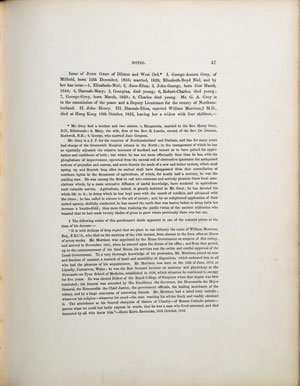

48. Edith-Christina, Constance-Anna, William-Llewellyn, Mary-Maud. IV. Mary-Ann-Isabella, married Edgar Garston, Esq., Liverpool. V. Frances-Hardy, married the Rev. George-Hunt Smyttan. VI. Charles-Grey, married Emily-Mary, daughter of Thomas Bolton, Esq., of Ballykisteen, Ireland, has a son, Oswald. Mr. C. G. Grey is a J. P. for the County of Tipperary, VII. Josephine-Elizabeth, married the Rev. George Butler, Oxford. VHI. Harriet-Jane, married Mons. Tell Meuricoffre, Naples. IX. Eleanor-Margaret. X. Emily-Georgina, married in 1856, Wm. J. Depledge, Esq., of Gateshead.
" The catholicity of soul and kindness of disposition which characterized the late Dr. Morrison, were well known to his numerous friends in this colony ; he was ever doing good by stealth, and blushed to find it fame ; his professional services were freely and gratuitously bestowed on all the Eoman Catholic Missionaries, who found themselves compelled to leave their stations in the interior to seek medical relief and rest in this colony. These services were brought to the notice of the Emperor of the French, who forthwith desired Dr. Morrison's acceptance of the decoration of the Legion of Honour. In connection with this honourable Imperial tribute paid to worth, at once deserving and modest, we have the following in a private letter, dated Paris, 29th December last. ' I saw Monseigneur For£ade previous to his leaving Europe for Martinique, where he has been appointed bishop: he told me that as Dr. Morrison had not been authorised by H. M.'s government to accept the Legion of Honour, the Emperor had decreed that a medal in gold should be struck, with a suitable inscription, and sent out to him. Poor man he is now removed from hence.' " We may take this opportunity of mentioning that a very handsome subscription has been made among the late Dr. Morrison's friends, patients, and the public, for the purpose of erecting a monument over his grave, which is being designed by Charles St. George Cleverly, Esq."—THE OVERLAND REGISTER, March 27th, 1854.
Letter of the Emperor of the French to Dr. Morrison. Ministere des Affaires Etrangeres. Paris, 12 Janvier, 1855. DIRECTION POLITIQUE. Monsieur, J'ai eu la satisfaction de faire connaitre a Sa Majeste l'Empereur le devouement, et l'abnegation avec lesquels, depuis de longues annees, vous prodiguer vos soins a la communaute francaise de Hong Kong, et particulierement aux membres de la mission catholique. Sa Majeste aurait vivement desire vous conferer, comme un temoignage de sa haute estime, la decoration de son ordre imperial de la Legion d'Honneur; mais la legislation de votre pays s'opposant a ce que cette distinction vous fut accordee, l'Empereur m'a charge de vous offrir en son nom la medaille qui accompagne cette lettre. Je suis personnellement heureux d'avoir a vous transmettre ce don qui vous sera doublement precieux, puisqu'il sera un souvenir de vos services en meme temps que de la bienveillance particuliere de Sa Majeste Imperiale. Recever, Monsieur, Tassurance de ma consideration la plus distinguee. DROUYN DE LHUYS. Monsieur Morrison, etc., etc., etc., a Hong Kong.
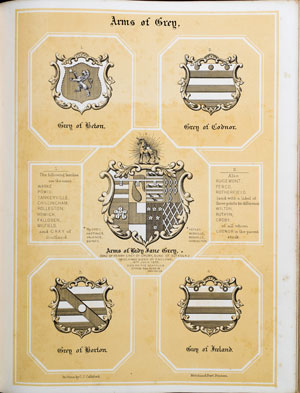
ARMS OF GREY
GREY OF HETON
GREY OF CODNOR
1.The following families are the same WARKE, POWIS, TANKERVILLE, CHILLINGHAM, ROLLESTON, HOWICK, FALLODEN, MILFIELD, and GRAY of Scotland
ARMS OF LADY JANE GREY (∗) (DAU: OF HENRY GREY OF GROBY, DUKE OF SUFFOLK.) PROCLAIMED QUEEN OF ENGLAND, 10™ JULY, 1553. DIED ON THE SCAFFOLD 12" FEB. 1554, AGED 16. PROV. XXX1.29.
(∗) Viz GREY, HASTINCS VALENCE, QUINCY, ASTLEY, WIDVILLE, BONVILLE, HARINGTON
2. Also RUCEMONT, PERGO, ROTHERFIELD, (and with, a label of three points for difference) WILTON, RUTHYN, GROBY, of all "whom CODNOR is the parent stock.
GREY OF HORTON
GREY OF IRELAND

49.
DEFINITION OF THE BRITISH CONSTITUTION. THE will of the people, freely and deliberately expressed, is, or ought to be, the foundation of every government, whatever may be the form of it. In this country its form is threefold,—King, Lords, and Commons,—each of which is possessed of powers peculiar to itself, but which are not independent; the one being provided with a check against the other, which maintains their equilibrium, and keeps them within the limits of a mutual control. The King is invested with the prerogative of making additions to the Peerage, as a check upon the House of Lords; the Commons have a control over the power of the Crown by the privilege of refusing the supplies; and the Crown has, by means of its power to dissolve the House of Commons, a control upon any violent and rash proceedings on the part of the Commons; but, if the majority of the House of Lords is to have the power, whenever they please, of opposing the declared and decided wishes both of the Crown and the people, without any means of modifying that power, then this country is placed under the domination of an uncontrollable oligarchy. If a majority of the House of Lords should have the power of acting adversely to the Crown and the Commons, and was determined to exercise that power, without being liable to check or control, the constitution is completely altered, and the government of this country is not a limited monarchy; it is no longer the Crown, the Lords, and Commons, but a House of Lords,—a separate oligarchy,—governing absolutely the others. EARL GREY.
The great characteristic of the Greys is their love of civil and religious liberty, and their advocacy of the rights of the people: in which has originated the suggestion of giving a copy of Magna Charta, as an appropriate appendage to this work; which I have been further induced to do, that this great palladium of British liberty might be more generally known, for, although there are scarcely any who have not heard of it, yet the numbers that have seen it are comparatively few.
E. H. BLACKHEDDON HOUSE, NORTHUMBERLAND. 20th November, 1856.
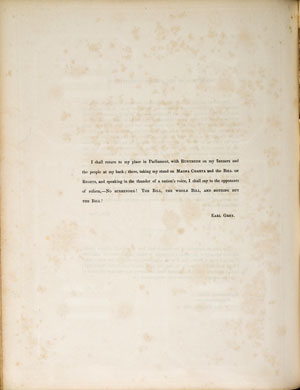
50.
I shall return to my place in Parliament, with RUNYMEDE on my banners and the people at my back; there, taking my stand on MAGNA CHARTA and the BILL OP RIGHTS, and speaking in the thunder of a nation's voice, I shall say to the opponents of reform,—No SURRENDER! THE BILL, THE WHOLE BILL, AND NOTHING BUT THE BILL !
EARL GREY.
Left: from family documents at Berwick archives. NRO 496 - Grey of Milfield. Letter to George Annett Grey from Edmund Hepple dated 14 March, 1857, after the publication of the book. He acknowledges a cheque for nine guineas, in payment of three copies of my “Grey History”. The letter describes his inventions including an idea for perpetual motion. The letter is annotated in George Annett Grey's handwriting "E. Hepple £9.9.0" It isn't known if the Milfield Grey family ordered any more copies. Two currently exist.
On the back page: "I am much obliged to you for getting me a few subscribers, as it shows you appreciate and reciprocate the good feeling that induced me to write the “History of the Grey family; which work is doing? entirely to my friendship with you; otherwise it most certainly never would have been done. I did not bring it out with a view to profit; at the same time I would not like to be out of pocket; / while the Greys I know will not suffer me to lose by it; and thus they may assist do as follows:-
Earl Grey and friends 5 copies 15.15
Sir George Grey friends 5 15.15
Earl of Durham 5 15.15
John Grey 7 22.1
G. A. Grey 7 22.1
Coln Burrell 4 12.12
Sir Walter Trevelyan 3 9.9
Revd. E. C. Ogle 3 9.9
John Fenwick 3 9.9
Henry Morton 3 9.9
R. J. Selby 3 9.9
48 copies £151.4
This would reimburse the cost, and give me a few pounds over for any trouble. E. H." Written across this page: "This work of mine puts a splendid feather in the cap of the Greys, therefore the more it is circulated the more will the honour of the family be exhalted. Very few were aware that the Greys stood out so high graded?; have been too long ostracised? by the Percys; but my book will place them where they ought to be, and give them a status in the county they never had before."







